Vedic chanting
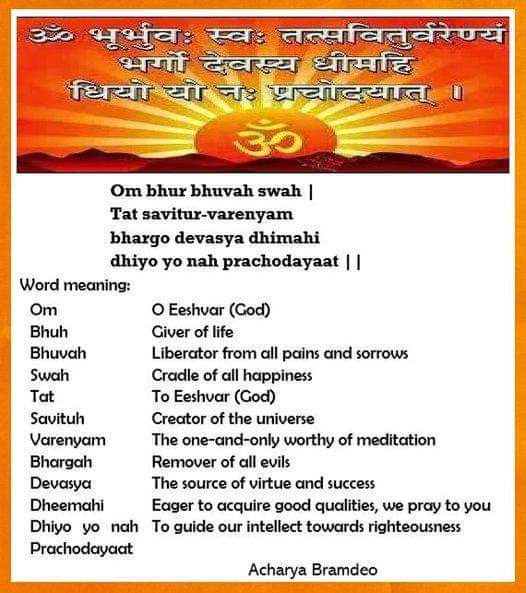

Gayatri Mantra was written by Rishi Vishwamitra. गायत्री मंत्र की रचना / दृष्टा
त्वमेव माता च पिता त्वमेव,
त्वमेव बन्धुश्च सखा त्वमेव।
त्वमेव विद्या च द्रविणं त्वमेव,
त्वमेव सर्वम् मम देवदेवं।।
सरल-सा अर्थ है- 'हे भगवान! तुम्हीं माता हो, तुम्हीं पिता, तुम्हीं बंधु, तुम्हीं सखा हो। तुम्हीं विद्या हो, तुम्हीं द्रव्य, तुम्हीं सब कुछ हो। तुम ही मेरे देवता हो।'
बचपन से प्रायः यह प्रार्थना हम सबने पढ़ी है।
मैंने 'अपने रटे हुए' कम से कम 50 मित्रों से पूछा होगा, 'द्रविणं' का क्या अर्थ है? संयोग देखिए एक भी न बता पाया। अच्छे खासे पढ़े-लिखे भी। एक ही शब्द 'द्रविणं' पर सोच में पड़ गए।
द्रविणं पर चकराते हैं और अर्थ जानकर चौंक पड़ते हैं। द्रविणं जिसका अर्थ है द्रव्य, धन-संपत्ति। द्रव्य जो तरल है, निरंतर प्रवाहमान। यानी वह जो कभी स्थिर नहीं रहता। आखिर 'लक्ष्मी' भी कहीं टिकती है क्या!
कितनी सुंदर प्रार्थना है और उतना ही प्रेरक उसका 'वरीयता क्रम'। ज़रा देखिए तो! समझिए तो!
सबसे पहले माता क्योंकि वह है तो फिर संसार में किसी की जरूरत ही नहीं। इसलिए हे प्रभु! तुम माता हो!
फिर पिता, अतः हे ईश्वर! तुम पिता हो! दोनों नहीं हैं तो फिर भाई ही काम आएंगे। इसलिए तीसरे क्रम पर भगवान से भाई का रिश्ता जोड़ा है।
जिसकी न माता रही, न पिता, न भाई तब सखा काम आ सकते हैं, अतः सखा त्वमेव!
वे भी नहीं तो आपकी विद्या ही काम आती है। यदि जीवन के संघर्ष में नियति ने आपको निपट अकेला छोड़ दिया है तब आपका ज्ञान ही आपका भगवान बन सकेगा। यही इसका संकेत है।
और सबसे अंत में 'द्रविणं' अर्थात धन। जब कोई पास न हो तब हे देवता तुम्हीं धन हो।
रह-रहकर सोचता हूं कि प्रार्थनाकार ने वरीयता क्रम में जिस धन-द्रविणं को सबसे पीछे रखा है,वहीं धन आजकल हमारे आचरण में सबसे ऊपर क्यों आ जाता है? इतना कि उसे ऊपर लाने के लिए माता से पिता तक, बंधु से सखा तक सब नीचे चले जाते हैं, पीछे छूट जाते हैं।
वह कीमती है, पर उससे ज्यादा कीमती माता, पिता, भाई,मित्र, विद्या हैं। उससे बहुत ऊँचे आपके अपने।
बार-बार ख्याल आता है, द्रविणं सबसे पीछे बाकी रिश्ते ऊपर। बाकी लगातार ऊपर से ऊपर, धन क्रमश: नीचे से नीचे!
याद रखिये दुनिया में झगड़ा रोटी का नहीं थाली का है! वरना वह रोटी तो सबको देता ही है!
चांदी की थाली यदि कभी हमारे वरीयता क्रम को पलटने लगे तो हमें इस प्रार्थना को जरूर याद कर लेना चाहिये
Q1. Om is also known as ____
sound of the divine
sound of a bee
sound of a river
Q2. How many letters are there in om?
1
2
3
Q3. What is the most obvious signal of life?
teeth
breath
eyes
Q4. Where does the sound originate from?
Naval
Chest
Throat
Q5. What s the meaning of sanskrit word- " nau "?
both of them
both of u
both of us
Q6. What are the two entities in " sah na vavatu " verse ?
A teacher and a student
A provider and a receiver
all the options are correct
Q7. What is the meaning of sanskrit word " saha" ?
he
together
help
Q8. What is the meaning of sanskrit word " avatu" ?
nourish
protect
both of us
Q9. What is the meaning of sanskrit word " bhunaktu" ?
organs
together
nourish / bhojanam
Q10. What is the meaning of sanskrit word " veeryam" ?
war
happy
energy
Q11. What is the meaning of sanskrit word " karvavahi" ?
eat together
write together
do together
Q12. What is the meaning of sanskrit word " tejaswi" ?
power
fight
bright and brilliant
Q13. What is the meaning of sanskrit word " adhitam" ?
seen
attend
attainment
Q14. What is the meaning of sanskrit word " maa" ?
not
here
there
Q15. What is the meaning of sanskrit word " vidvishawahai" ?
have conflict
laugh
journey
Q16. How many syllables does Gayatri Mantra have ?
20
24
30
Q17. How many names are there of Gayatri Mantra?
3
5
7
Q18. Which mantra is called guru mantra?
maha mrityun jai mantra
shanti mantra
gayatri mantra
Q19. What is the meaning of sanskrit word " bhu" ?
the remover
excellent
Life of all creatures
Q20. What is the meaning of sanskrit word " vareniyam"?
excellent
fair
poor
- Sound of the divine
- Three
- Breath
- Naval
- Both of us
- All the options are correct
- Together
- Protect
- Nourish/Bhojanam
- Energy
- Do together
- Bright and brilliant
- Attainment
- Not
- Have conflict
- 24
- 7
- Gayatri mantra
- Life of all creatures
- Excellent
Mahamrityunjaya mantra
ॐ त्र्यम्बकं यजामहे सुगन्धिं पुष्टिवर्धनम्।
उर्वारुकमिव बन्धनान् मृत्योर्मुक्षीय मामृतात्॥
Om tryambakam yajamahe
sugandhim pushti vardhanam ।
Urvarukamiv bandhanan
mrityormukshiya maamritat ।।
ॐ Om = a sacred syllable.
त्र्यम्बकं tryambakam = who has three eyes/ There are three mothers whose name is Tryambak.
यजामहे yajamahe = One who is prayed or worshipped
सुगन्धिम् sugandhim = fragrance
पुष्टि pushti = Prosperous, fulfilled
वर्धनम् vardhanam = One who nourishes, strengthens, increases health, wealth, well-being.
उर्वारुकमिव urvarukam iva- = like a ripe melon.
diseases, obstacles in life, resulting depression
बन्धनान् bandhanan = attachment which can bind down
मृत्योर्मुक्षीय mrityormukshiya = Free or liberate from death
माऽमृतात् maamritat = Free me from death but not from immortality.
Mahamrityunjaya Mantra Meaning:
Om. We pray to The Three-Eyed Lord Shiva who is fragrant and who increasingly nourishes the devotees. Worshipping him may we be liberated from death to attain immortality just as the ripe cucumber easily separates itself from the binding stalk.
Mahamrityunjaya Mantra Importance/Benifits:
It is the collection of high-energy words when chanted in proper rhythm creates positive and divine vibrations around the body of the chanter which acts as a protective shield for the devotee.
Mahamrityunjaya Mantra is the life-saving mantra from untimely death or any fear.
This is the most powerful healing mantra which has been adopted from ancient times till now.
It has the power to give health, wealth, peace, prosperity, or salvation by first eliminating all the problems.
It has been tested on patients when all medical treatments failed and chanting or playing the mantra around the patient has done wonders in their lives.
The divine vibrations of this mantra are not only for treating diseases but also removes any fear, anxiety, or mental illness and keeps away from any negative energy. This mantra brings happiness, peace, calmness, and consciousness in the mind of a chanter.
It will work in subtle ways, not necessarily it will affect directly in materialism. but it will give you enough mental strength, power, and virtues of Lord Shiva.
This is also called Moksha Mantra where one can connect with the highest supreme with the help of this mantra. Understand the meaning of the last line of the mantra which says freedom from the cycle of life-death and attain salvation.
Devotee receives blessings of Lord Shiva which is the most beautiful thing.This mantra is self-sufficient in every aspect.
Gayatri or Guru mantra
ॐ भूर्भुवःस्वः । तत् सवितुर्वरेण्यं भर्गो देवस्य धीमहि। धियो यो न: प्रचोदयात्।।
Om bhur bhuvah swah.Tat savitur varenyam bhargo devasya dhimahi.Dhiyo yo nah prachodayat .
-यजु0 35/3, -ऋग् 3/62/10, साम0 उ0 6/3
Many names of this Gayatri Mantra
1.Gayatri- It belongs to the Gayatri class of metres ( composed of 23 or 24 syllables excluding the vyahritis)., this mantra is called Gayatri Mantra.
2.Savitri- The devata of this mantra is Savita, hence this mantra is called Savitri Mantra.
3.Gurumantra- In Vedarambha Sanskar ,the guru preaches this mantra to his disciple, so this mantra is called Gurumantra.
4.Vedmata- In Atharvaveda this mantra has been called Vedmata.
5.Mantraraj-This mantra is the best among all the mantras. In some places this mantra is called Mantraraj.
6.Vedamukh- Gayatri Mantra being the main mantra in the Vedas, this mantra is called Vedamukh.
7.Kamdhenu- Gayatri Mantra fulfills all desires, hence this mantra is called Kamdhenu.
The mantra is preceded by three sacred expressions, the Mahavyahritis - The great utterances. It is called Guru mantra , because , firstly ,it convey a great sance , secondly, it is employed by the preceptor to initiate a pupil. It is also named as Gayatri mantra, because firstly ,it protects the reciter from ill-intentions and secondly , it belongs to the Gayatri class of metres ( composed of 23 or 24 syllables excluding the vyahritis). According to subject matter of the mantra it has been given the name of Savitri.
Paraphrase - संक्षिप्त व्याख्या
Om = the Almighty God
Bhur = the lifebreath of all creatures,dearer than even the life itself. Eternal existence (three things have eternal existance-- Sansar, atma, parmatma). Nitya.
Bhuvah = the remover of all evils and pains. That thing which can think. Atma- chetan/chit/conscious-- chintan (Atma and Parmatma).
Swah = and the motivator of the universe. Bliss, Anand.
Om Bhur bhuvah swah is same as Satchitanand
Tat = that
Savitar = of the impeller and the creator of the universe. Savita Bhagvan, illuminator
Varenyam = excellent, adorable, chosen
Bhargah = splendour
Devasya = the divine enlightenet of all and the besower of bliss
Dhimahi = May we perceive, reflect
Dhiyoh = intellectual faculties to follow the virtuous path
Yoh = may he who holds the excellent splendour
Nah = our
Prachodayat = direct, guide, stimulate, instigate
Purport = भावार्थ
O omnipotent God! Thou art our dearest life-breath.Keep us away from evil intentions and physical suffering. May we ever thy pure vision in over mind. O Divine Englihtener ! Lead kindly light to us. May the splendour-nature direct our minds towards the righteous path. May we attain not only physical progress but also ultimate emancipation.
Yajurved:
देवता: सविता देवता ऋषि: विश्वामित्र ऋषिः छन्द: निचृद् गायत्री स्वर: षड्जः
तत् स॑वि॒तुर्वरे॑ण्यं॒ भर्गो॑ दे॒वस्य॑ धीमहि। धियो॒ यो नः॑ प्रचो॒दया॑त् ॥३५॥
मन्त्र उच्चारण
Tat Savitu.mp3
पद पाठ
तत्। स॒वि॒तुः। वरे॑ण्यम्। भर्गः॑। दे॒वस्य॑। धी॒म॒हि॒। धि॒यः॑। यः। नः॒। प्र॒। चो॒द॒या॒त् ॥३५॥
यजुर्वेद » अध्याय:3» मन्त्र:35 उपलब्ध भाष्य
हिन्दी - स्वामी दयानन्द सरस्वती
उस जगदीश्वर की कैसी स्तुति, प्रार्थना और उपासना करनी चाहिये, इस विषय का उपदेश अगले मन्त्र में किया है ॥
पदार्थान्वयभाषाः -हम लोग (सवितुः) सब जगत् के उत्पन्न करने वा (देवस्य) प्रकाशमय शुद्ध वा सुख देनेवाले परमेश्वर का जो (वरेण्यम्) अति श्रेष्ठ (भर्गः) पापरूप दुःखों के मूल को नष्ट करनेवाला तेजःस्वरूप है (तत्) उसको (धीमहि) धारण करें और (यः) जो अन्तर्यामी सब सुखों का देनेवाला है, वह अपनी करुणा करके (नः) हम लोगों की (धियः) बुद्धियों को उत्तम-उत्तम गुण, कर्म, स्वभावों में (प्रचोदयात्) प्रेरणा करे ॥३५॥
भावार्थभाषाः -मनुष्यों को अत्यन्त उचित है कि इस सब जगत् के उत्पन्न करने वा सब से उत्तम सब दोषों के नाश करने तथा अत्यन्त शुद्ध परमेश्वर ही की स्तुति, प्रार्थना और उपासना करें। किस प्रयोजन के लिये, जिससे वह धारण वा प्रार्थना किया हुआ हम लोगों को खोटे-खोटे गुण और कर्मों से अलग करके अच्छे-अच्छे गुण, कर्म और स्वभावों में प्रवृत्त करे, इसलिये। और प्रार्थना का मुख्य सिद्धान्त यही है कि जैसी प्रार्थना करनी, वैसा ही पुरुषार्थ से कर्म का आचरण करना चाहिये ॥३५॥
Rigved
Devata: सविता Rishi: गोपवन आत्रेयः सप्तवध्रिर्वा Chhanda: निचृद्गायत्री Swara: षड्जः
तत्स॑वि॒तुर्वरे॑ण्यं॒ भर्गो॑ दे॒वस्य॑ धीमहि। धियो॒ यो नः॑ प्रचो॒दया॑त्॥
English Transliteration
tat savitur vareṇyam bhargo devasya dhīmahi | dhiyo yo naḥ pracodayāt ||
Pad Path
तत्। स॒वि॒तुः। वरे॑ण्यम्। भर्गः॑। दे॒वस्य॑। धी॒म॒हि॒। धियः॑। यः। नः॒। प्र॒ऽचो॒दया॑त्॥
Rigveda » Mandal:3» Sukta:62» Mantra:10 | Ashtak:3» Adhyay:4» Varga:10» Mantra:5 | Mandal:3» Anuvak:5» Mantra:10 SWAMI DAYANAND SARSWATI
Word-Meaning: -हे मनुष्यो ! सब हम लोग (यः) जो (नः) हम लोगों की (धियः) बुद्धियों को (प्रचोदयात्) उत्तम गुण-कर्म और स्वभावों में प्रेरित करै उस (सवितुः) सम्पूर्ण संसार के उत्पन्न करनेवाले और सम्पूर्ण ऐश्वर्य्य से युक्त स्वामी और (देवस्य) सम्पूर्ण ऐश्वर्य के दाता प्रकाशमान सबके प्रकाश करनेवाले सर्वत्र व्यापक अन्तर्यामी के (तत्) उस (वरेण्यम्) सबसे उत्तम प्राप्त होने योग्य (भर्गः) पापरूप दुःखों के मूल को नष्ट करनेवाले प्रभाव को (धीमहि) धारण करैं ॥१०॥
Connotation: -जो मनुष्य सबके साक्षी, पिता के सदृश वर्त्तमान, न्यायेश, दयालु, शुद्ध, सनातन, सबके आत्माओं के साक्षी परमात्मा की ही स्तुति और प्रार्थना करके उपासना करते हैं, उनको कृपा का समुद्र सबसे श्रेष्ठ परमेश्वर, दुष्ट आचरण से पृथक् करके श्रेष्ठ आचरण में प्रवृत्त करा और पवित्र तथा पुरुषार्थयुक्त करके धर्म, अर्थ, काम और मोक्ष को प्राप्त कराता है ॥१०॥
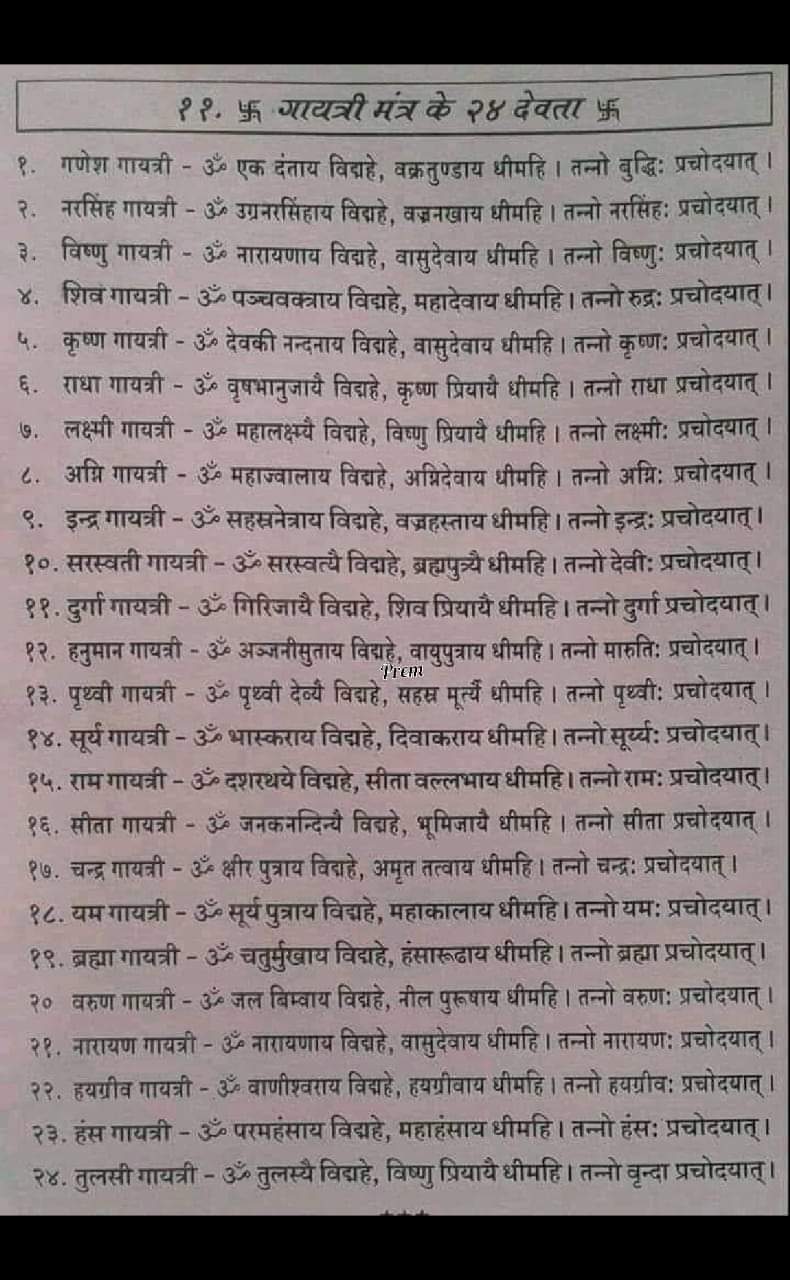
विश्वानि मंत्र का हिंदी मे अर्थ
हे सब सुखों के दाता ज्ञान के प्रकाशक सकल जगत के उत्पत्तिकर्ता एवं समग्र ऐश्वर्ययुक्त परमेश्वर! आप हमारे सम्पूर्ण दुर्गुणों, दुर्व्यसनों और दुखों को दूर कर दीजिए, और जो कल्याणकारक गुण, कर्म, स्वभाव, सुख और पदार्थ हैं, उसको हमें भलीभांति प्राप्त कराइये।
First vices have to go and then good qualities come. When Samudramanthan was done, poison came out first and then the amrit.
vedic chanting Hiranya ....pdf
देवता: हिरण्यगर्भो देवता
ऋषि: प्रजापतिर्ऋषिः
छन्द: त्रिष्टुप्
स्वर: धैवतः
हि॒र॒ण्य॒ग॒र्भः सम॑वर्त्त॒ताग्रे॑ भू॒तस्य॑ जा॒तः पति॒रेक॑ऽआसीत्। स दा॑धार पृथि॒वीं द्यामु॒तेमां कस्मै॑ दे॒वाय॑ ह॒विषा॑ विधेम ॥१० ॥
मन्त्र उच्चारण-- Hirangarbhaya.mp3
पद पाठ
हि॒र॒ण्य॒ग॒र्भ इति॑ हिरण्यऽग॒र्भः। सम्। अ॒व॒र्त्त॒त॒। अग्रे॑। भू॒तस्य॑। जा॒तः। पतिः॑। एकः॑। आ॒सी॒त्। सः। दा॒धा॒र॒। पृ॒थि॒वीम्। द्याम्। उ॒त। इ॒माम्। कस्मै॑। दे॒वाय॑। ह॒विषा॑। वि॒धे॒म॒ ॥१० ॥
यजुर्वेद » अध्याय:25» मन्त्र:10
हिन्दी - स्वामी दयानन्द सरस्वती
पदार्थान्वयभाषाः -हे मनुष्यो ! जैसे हम लोग जो (हिरण्यगर्भः) सूर्यादि तेजवाले पदार्थ जिसके भीतर हैं, वह परमात्मा (जातः) प्रादुर्भूत और (भूतस्य) उत्पन्न हुए जगत् का (एकः) असहाय एक (अग्रे) भूमि आदि सृष्टि से पहिले भी (पतिः) पालन करने हारा (आसीत्) है और सब का प्रकाश करनेवाला (अवर्त्तत) वर्त्तमान हुआ (सः) वह (पृथिवीम्) अपनी आकर्षण शक्ति से पृथिवी (उत) और (द्याम्) प्रकाश को (सम् दाधार) अच्छे प्रकार धारण करता है तथा जो (इमाम्) इस सृष्टि को बनाता हुआ अर्थात् जिसने सृष्टि की उस (कस्मै) सुख करने हारे (देवाय) प्रकाशमान परमात्मा के लिये (हविषा) होम करने योग्य पदार्थ से (विधेम) सेवन का विधान करें, वैसे तुम लोग भी सेवन का विधान करो ॥१० ॥
भावार्थभाषाः -इस मन्त्र में वाचकलुप्तोपमालङ्कार है। हे मनुष्यो ! जिस परमात्मा ने अपने सामर्थ्य से सूर्य आदि समस्त जगत् को बनाया और धारण किया है, उसी की उपासना किया करो ॥१० ॥
य आ॑त्म॒दा ब॑ल॒दा यस्य॒ विश्व॑ऽउ॒पास॑ते प्र॒शिषं॒ यस्य॑ दे॒वाः।
यस्य॑ छा॒यामृतं॒ यस्य॑ मृ॒त्युः कस्मै॑ दे॒वाय॑ ह॒विषा॑ विधेम॥
यजु. अ. २५, मंत्र १३ 25/13
य आत्मदा बलदा यस्य विश्व उपासते प्रशिषं यस्य देवा: ।
यस्य छायाऽमृतं यस्य मृत्यु: कस्मै देवाय हविषा विधेम: ॥
Om Ya aatmada balada yasya vishve upaasate prashisham yasya deva
yasya chhaaya amritam yasya mrityu kasmayee devaa ya havishaa vidhema
Om ya ātmadā baladā yasya vishwa, upāsaté prashiṣham yasya dévāh
Yasya chhāyā’mritam yasya mrityuḥ kasmai dévāya haviṣhā vidhéma.
Ya- who
Aatmada- giver of atma and atmgyan
Balada- giver of strength to body, atma, and society
Yasya- whom
Vishve- all in this universe
Upasate- pray to
Prashisham- Instructions
Yasya- whose
Deva- very learned people, yogis
Yasya- whose
Chhaya- Shadow/refuge imparts
Amritam- Immortality
Yasya- whose ( absence of whose refuge leads to)
Mrityu- Death
Kasmai- that radiant
Devaya- Parmatma
Yah- who
Havishaa- with atma and mind
Vidhema- Let us engage in the devotion of
This mantra strengthens the belief that Parmatma is the ultimate giver.
जो परमात्मा अपने लोगों को अपनी कृपा से ही “आत्मदाः” आत्मा का देनेवाला तथा आत्मज्ञानादि, knowledge of our inner self, our true nature, का दाता है, जीवप्राणदाता तथा “बलदाः” त्रिविध बल ( Best stength is a combination of the strength of body, atma, and society)—एक मानस विज्ञानबल, द्वितीय इन्द्रियबल, अर्थात् श्रोत्रादि की स्वस्थता, तेजोवृद्धि, तृतीय शरीरबल नाम नैरोग्य, महापुष्टि, दृढ़ाङ्गता और वीर्यादि वृद्धि इन तीनों बलों का जो दाता है, जिसके “प्रशिषम्” अनुशासन (शिक्षा-मर्यादा) को यथावत् विद्वान् लोग मानते हैं, सब प्राणी-अप्राणी—जड़-चेतन, विद्वान् वा मूर्ख उस परमात्मा के नियमों का कोई कभी उल्लङ्घन नहीं कर सकता.I जिसकी “छाया” आश्रय ही अमृत, विज्ञानी लोगों का मोक्ष कहाता है। तथा जिसकी अछाया (अकृपा)वारम्वार मरण और जन्मरूप महाक्लेशदायक है। वही एक परमसुखदायक पिता है। आओ सब प्रेम, विश्वास और भक्ति करें, कभी उसको छोड़के अन्य को उपास्य न मानें। वह अपने को अत्यन्त सुख देगाI जो सुख स्वरूप और सब प्रजा का पति है उस परमेश्वर देव की प्राप्ति के लिए सत्य प्रेम भक्तिरूप सामग्री ( with atma and mind) से हम लोग नित्य भजन किया करे, जिससे हम लोगो को किसी प्रकार का दुःख कभी न हो.
He is the giver of spiritual knowledge and bestower of strength to body and atma. He is meditated upon by all the learned and He is their inspiration. His shelter is Moksha and staying away from Him leads to degradation and destruction. May we contemplate upon that Blissful Parmatma with devotion.
यः प्रा॑ण॒तो नि॑मिष॒तो म॑हि॒त्वैक॒ऽइद्राजा॒ जग॑तो ब॒भूव॑।
यऽईशे॑ऽअ॒स्य द्वि॒पद॒श्चतु॑ष्पदः॒ कस्मै॑ दे॒वाय॑ ह॒विषा॑ विधेम ॥३ ॥
यः। प्रा॒ण॒तः। नि॒मि॒ष॒त इति॑ निऽमिष॒तः। म॒हि॒त्वेति॑ महि॒ऽत्वा। एकः॑। इत्। राजा॑। जग॑तः। ब॒भूव॑।
यः। ईशे॑। अ॒स्य। द्वि॒पद॒ इति॑ द्वि॒ऽपदः॑। चतु॑ष्पदः। चतुः॑पद इति॒ चतुः॑पदः। कस्मै॑। दे॒वाय॑। ह॒विषा॑। वि॒धे॒म॒ ॥३ ॥
यजुर्वेद- अध्याय:23- मन्त्र:3
Yah Pranato nimishato mahitveka
id raja jagato babhuva।
Ya eeshe asya dvipadash chatushpadah
kasmai devaya havisha vidhema ।।
पदार्थान्वयभाषाः -
हे मनुष्यो ! जैसे हम लोग (यः) जो (एकः) एक (इत्) ही (महित्वा) अपनी महिमा से (निमिषतः) नेत्र आदि से चेष्टा को करते हुए (प्राणतः) प्राणी रूप (द्विपदः) दो पगवाले मनुष्य आदि वा (चतुष्पदः) चार पगवाले गौ आदि पशुसम्बन्धी इस (जगतः) संसार का (राजा) अधिष्ठाता (बभूव) होता है और (यः) जो (अस्य) इस संसार का (ईशे) सर्वोपरि स्वामी है, उस (कस्मै) आनन्दस्वरूप (देवाय) अतिमनोहर परमेश्वर की (हविषा) विशेष भक्तिभाव से (विधेम) सेवा करें, वैसे विशेष भक्तिभाव का आप लोगों को भी विधान करना चाहिये ॥३ ॥
भावार्थभाषाः -इस मन्त्र में वाचकलुप्तोपमालङ्कार है। हे मनुष्यो ! जो एक ही सब जगत् का महाराजाधिराज, समस्त जगत् का उत्पन्न करनेहारा सकल ऐश्वर्ययुक्त महात्मा न्यायाधीश है, उसी की उपासना से तुम सब धर्म, अर्थ, काम और मोक्ष के फलों को पाकर सन्तुष्ट होओ ॥३ ॥
O Almighty Parmatma! Thou art the sole controller of the universe. All the species of the animate kingdom came into existence through thy gracious agency. O Blissful Parmatma ! May we offer our dearest possessions to Thy service.
Nimishatah-Not only is the conscious under the rule of Parmatma, the material world is also dependent on Parmatma. Not even an atom can disrespect the law of Parmatma. The properties and actions of matter are inherent in it, and the material world is running strictly within these rules.
Ya eeshe dvipadash – chatushpadah-Whether the creature has taken birth in human form or whether it is an insect, mosquito, animal, bird, it is the rule of Parmatma everywhere. No creation is outside the rule of Parmatma.
- Yah = who
- pranatah = of animate and
- nimishatah = inanimate
- mahitva = by power of his mahima/glory
- eka it = the sole
- raja = brilliant ruler
- jagatah = world
- babhuva = is
- Ya = who
- eeshe = creats the bodies of
- asya = these wordly
- dvipadah = bipeds like men and
- chatushpadah = quadrupeds like cow etc.
- kasmai = that blisful and
- devaya = Parmatma
- havisha = with our best resources, intentions, and will power
- vidhema = Let us serve
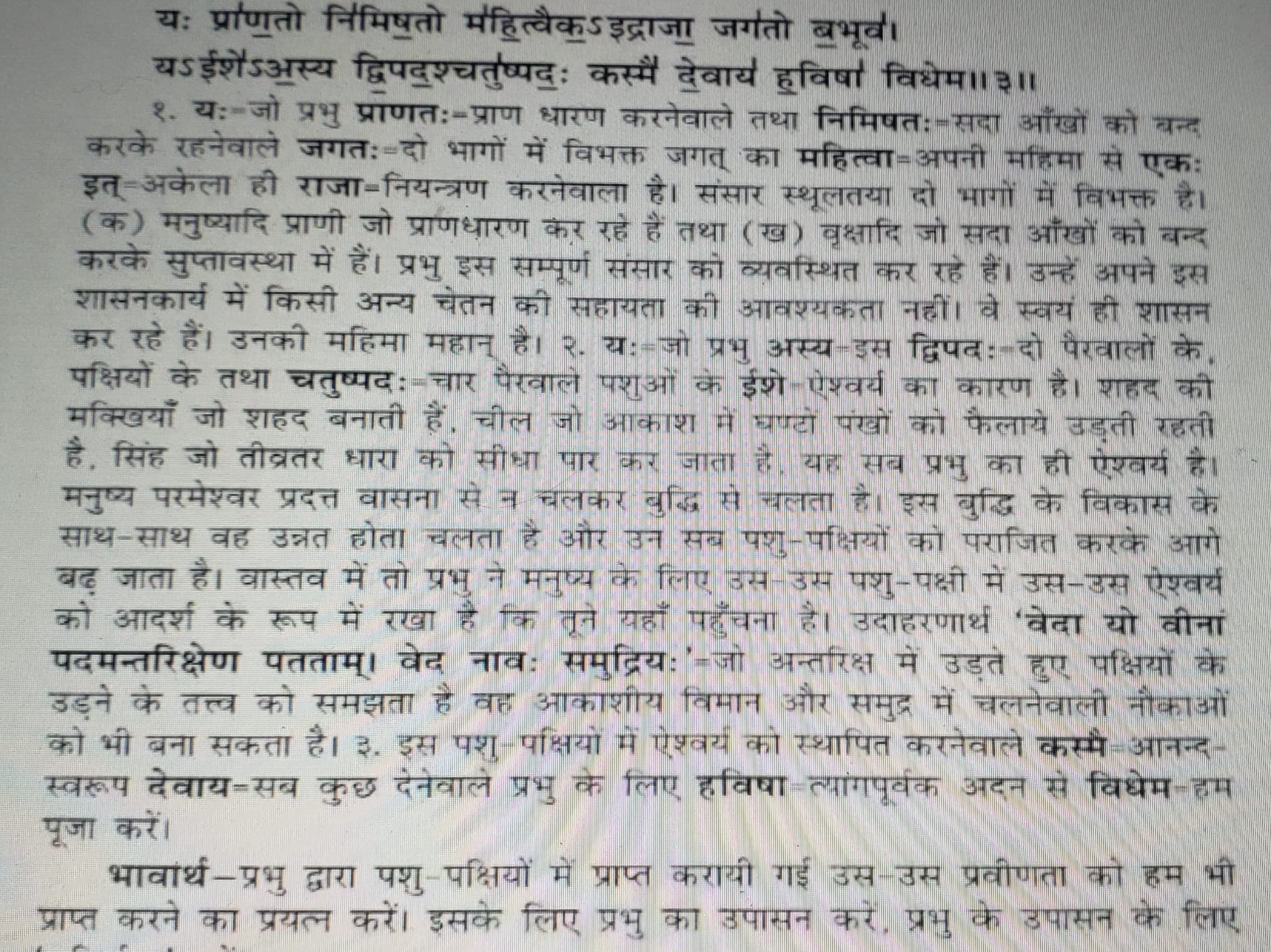
येन॒ द्यौरु॒ग्रा पृ॑थि॒वी च॑ दृ॒ढा येन॒ स्व᳖ स्तभि॒तं येन॒ नाकः॑। योऽ अ॒न्तरि॑क्षे॒ रज॑सो वि॒मानः॒ कस्मै॑ दे॒वाय॑ ह॒विषा॑ विधेम ॥६ ॥ Yajurved 32- 6
येन॑। द्यौः। उ॒ग्रा। पृ॒थि॒वी। च॒। दृ॒ढा। येन॑। स्व᳖रिति॒ स्वः᳖। स्त॒भि॒तम्। येन॑। नाकः॑ ॥ यः। अ॒न्तरि॑क्षे। रज॑सः। विमान॒ इति॑ वि॒ऽ मानः॑। कस्मै॑। दे॒वाय॑। ह॒विषा॑। वि॒धे॒म॒ ॥६ ॥ यजुर्वेद - अध्याय » 32; मन्त्र » 6
yena dyaurugra prithivi cha dridha, yen swa stabhitam yena naakah ।
yo antarikshe rajaso vimanah, kasamai devaya havisha vishram ।।
ऋषि: - स्वयम्भु ब्रह्म ऋषिः
देवता - परमात्मा देवता
छन्दः - निचृत त्रिष्टुप्
स्वरः - धैवतः
yena = by whom (येन) जिस जगदीश्वर ने, जगदीश्वरेण
dauh = like the sun (द्यौः) प्रकाशयुक्त सूर्य्यादि पदार्थ, सूर्यादिप्रकाशवान् पदार्थः
ugra = the formidable bodies (उग्रा) तीव्र तेजवाले, तीव्रतेजस्का
prithvi = the earth (पृथिवी) भूमि, भूमिः
cha = and (च) और
dridha = are sustained, Hard or dense (दृढा) द्य्ढ़ की है, दृढीकृता
yeha = by whom (येन) जिसने
svah = all worldly pleasures (स्वः) सुख को, सुखम्
stabhitam = are established (स्तभितम्) धारण किया, धृतम्
yena = by whom (येन) जिसने
naakah = ultimate soltitude is fixed (नाकः) सब दुःखों से रहित मोक्ष को धारण किया, अविद्यमानदुःखो मोक्षः
yah = who (यः) जो
vimanah = Creates and sets revolving (विमानः) विविध मान करने वाला है, विविधं मानं यस्मिन् सः
rajasah = all the cosmic bodies (रजसः) लोकसमूह क, लोकसमूहस्य। लोका रजांस्युच्यन्त इति निरुक्तम्
antarikshe = in space (अन्तरिक्षे) मध्यवर्ती आकाश में वर्त्तमान, मध्यवर्त्तिन्याकाशे
Kasamai =that blissful (कस्मै) सुखस्वरूप, सुखस्वरूपाय
devaya = amiable god (देवाय) स्वयं प्रकाशमान, सकल सुखदाता ईश्वर के लिये हम लोग, स्वप्रकाशाय सकलसुखदात्रे
havisha = with our full efficacy (हविषा) प्रेम भक्ति से ,प्रेमभक्तिभावेन
vidhema = let us adore (विधेम) सेवाकारी वा प्राप्त होवें॥ परिचरेम प्राप्नुयाम व
O All -pervading God ! Thou hast created the luminous and non-luminous cosmic bodies through thy infinite Power. Thou hast established the planets and stars in space and keepst them revolving. O Graceful Lord Thou dispensest to the living beings earthly happiness and ultimate emancipation just according to their virtuous
deeds. O Amiable and Blissful God ! may we attain competency to adore thee in the best-befitting manner.
हे मनुष्यो! जो समस्त जगत् का धर्त्ता, सब सुखों का दाता, मुक्ति का साधक, आकाश के तुल्य व्यापक परमेश्वर है, उसी की भक्ति करो॥६॥
हे मनुष्याः! यः सकलस्य जगतो धर्त्ता सर्वसुखप्रदाता मोक्षसाधक आकाश इव व्याप्तः परमेश्वरोऽस्ति तस्यैव भक्तिं कुरुत॥६॥
Main idea-
Difference between Jivatma and Paramatma, Worshiper and God, son and father, servant and master. God is very powerful and we are nothing before Him.
yena dyaurugra prithvi cha dridha-
The creation of the world is of two types. Some are the bright ones and some are the dark ones. That Lord has held both types of worlds. The body in which the soul resides cannot even hold it. As soon as the soul leaves the body, the soul cannot even hold that body. The Lord has possessed the entire universe. We do not have the capacity to hold even a single atom.
Yen Svah Stabhitam Yen Nakah-
Some people in the world desire to enjoy the pleasures of the world while some want salvation, free from all kinds of sorrows. Both types of happiness and pleasure are dependent on the Lord. For both, the refuge of the Lord is the basis. Even the pleasures of the world cannot be attained without the will of GOD.
Yo antrikshe rajso vimanah-
God has created all the worlds with his own power with special rules. There is no error in his creation.
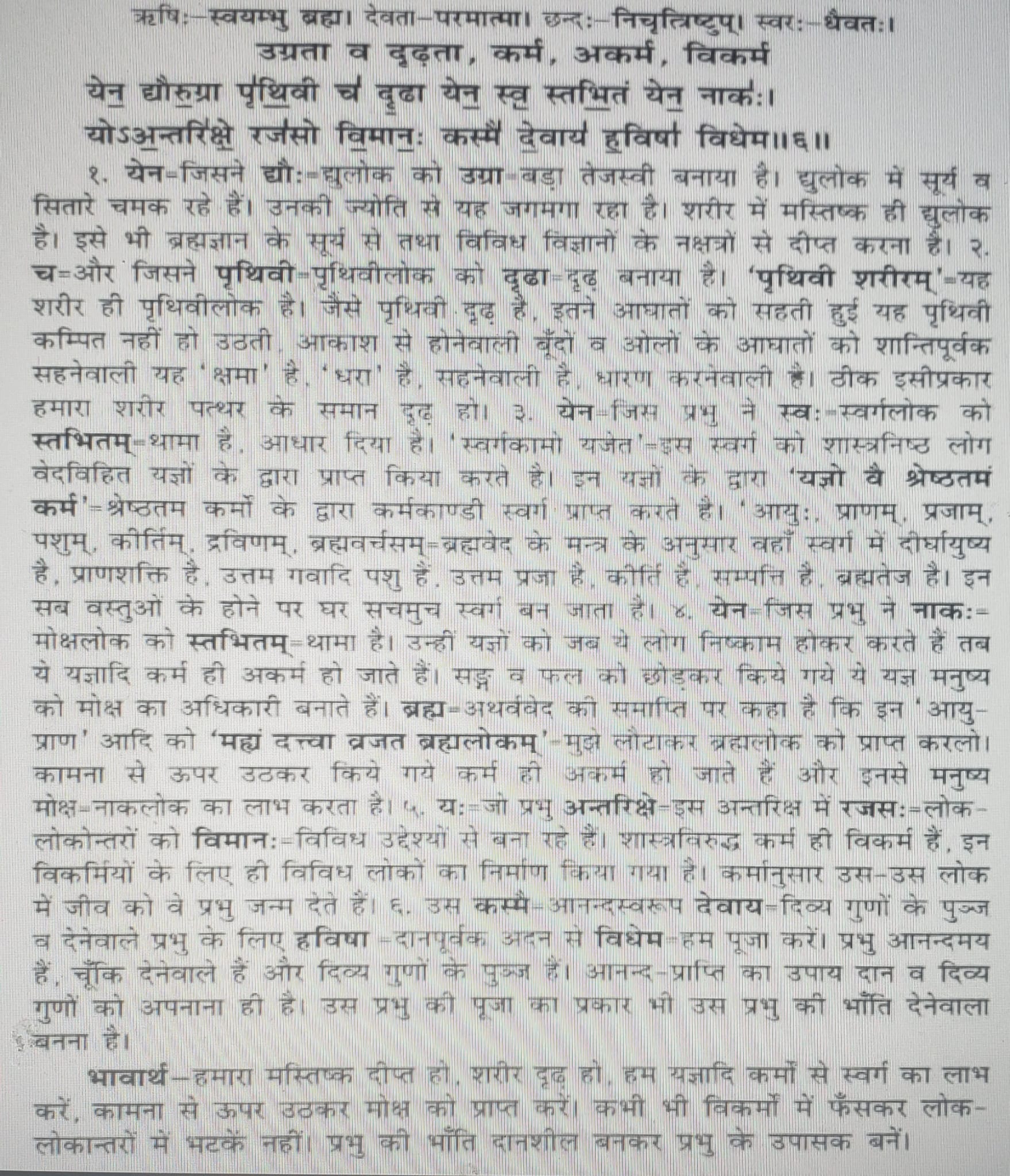
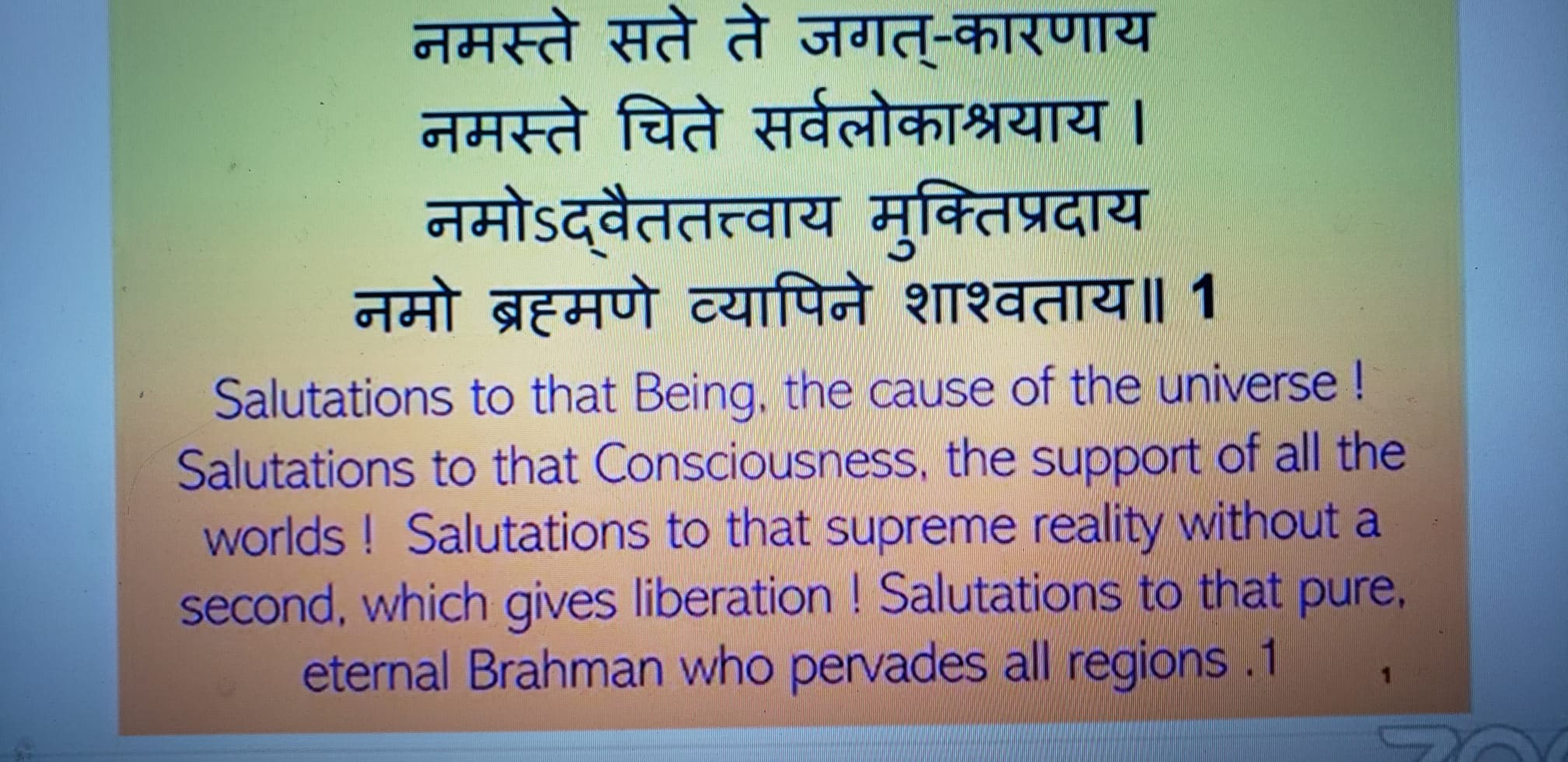
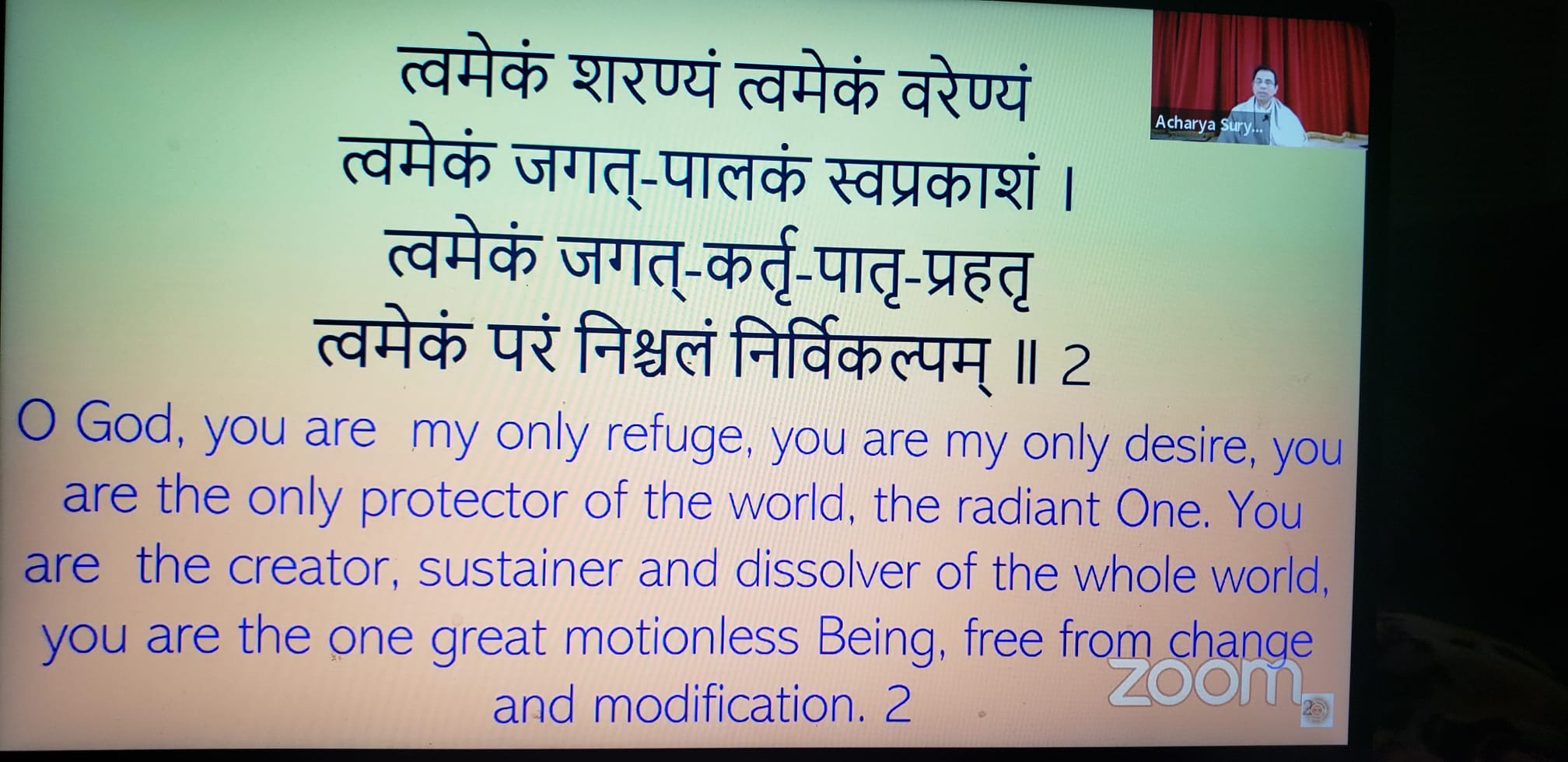
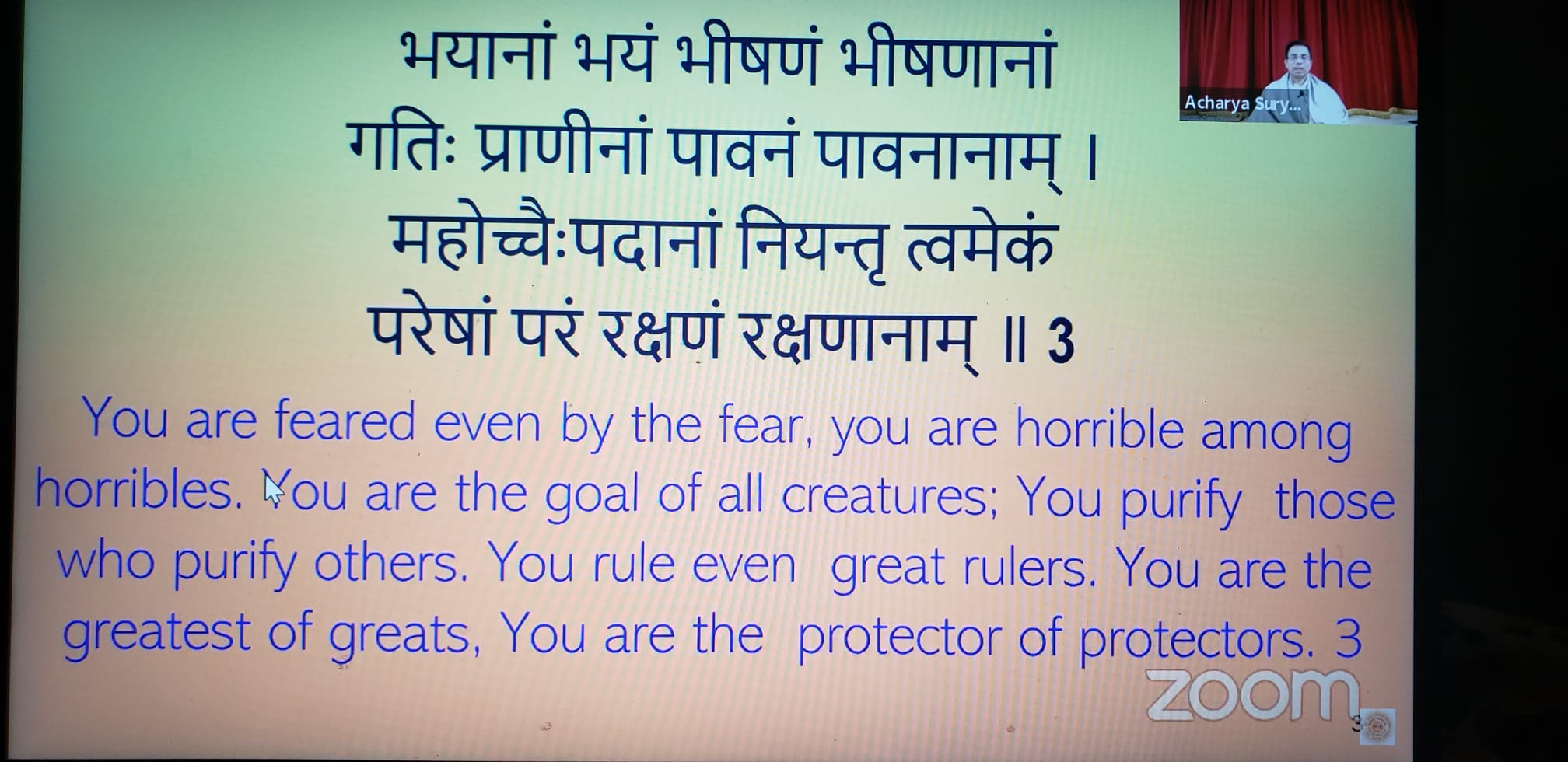
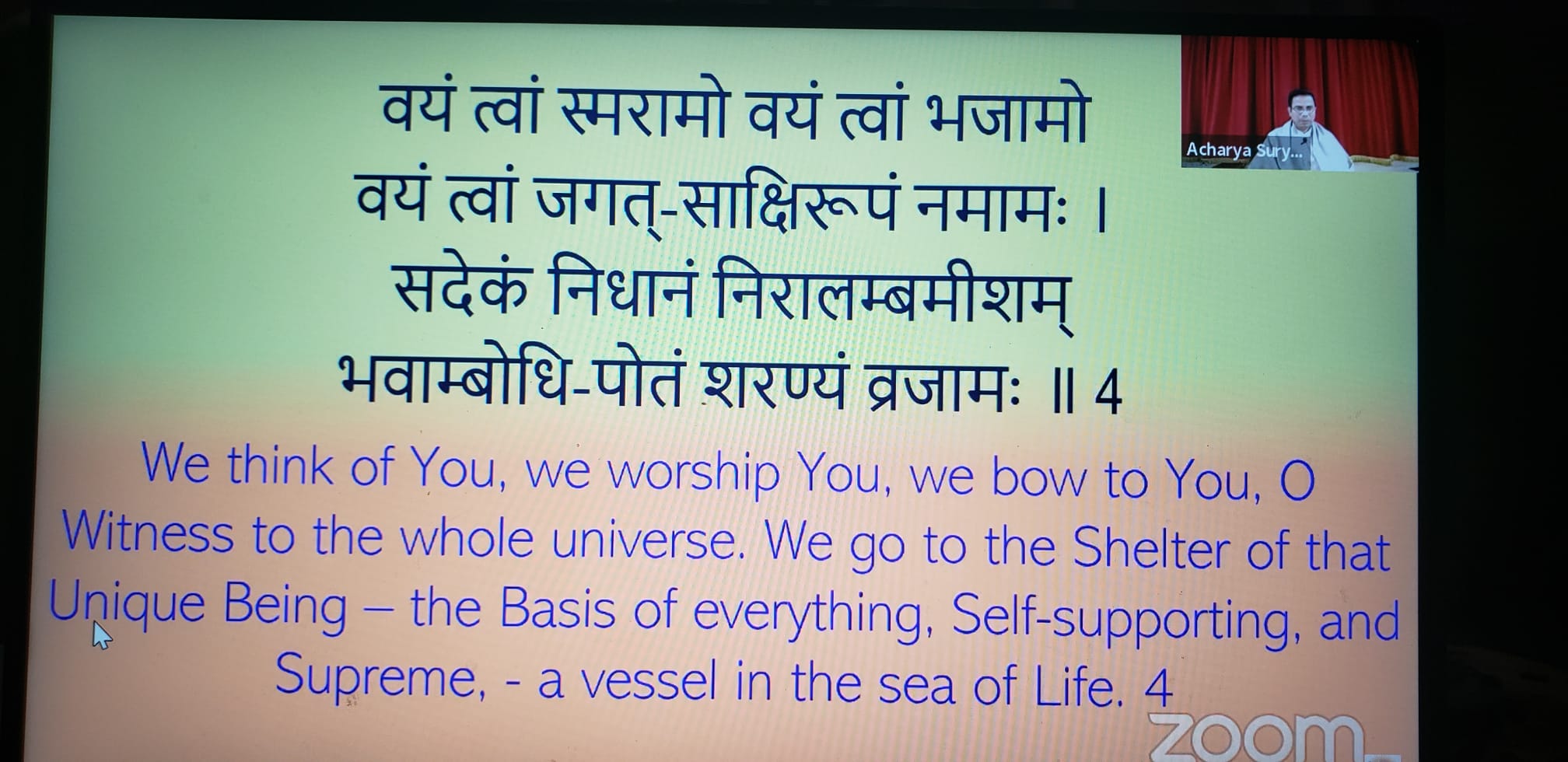
प्रजा॑पते॒ न त्वदे॒तान्य॒न्यो विश्वा॑ जा॒तानि॒ परि॒ ता ब॑भूव । यत्का॑मास्ते जुहु॒मस्तन्नो॑ अस्तु व॒यं स्या॑म॒ पत॑यो रयी॒णाम् ॥
prajāpate na tvad etāny anyo viśvā jātāni pari tā babhūva | yatkāmās te juhumas tan no astu vayaṁ syāma patayo rayīṇām ||
Pad Path
प्रजा॑ऽपते । न । त्वत् । ए॒तानि॑ । अ॒न्यः । विश्वा॑ । जा॒तानि॑ । परि॑ । ता । ब॒भू॒व॒ । यत्ऽका॑माः । ते॒ । जु॒हु॒मः । तत् । नः॒ । अ॒स्तु॒ । व॒यम् । स्या॒म॒ । पत॑यः । र॒यी॒णाम् ॥ १०.१२१.१०
Rigveda » Mandal:10» Sukta:121» Mantra:10 | Ashtak:8» Adhyay:7» Varga:4» Mantra:5 | Mandal:10» Anuvak:10» Mantra:10
ऋषि : हिरण्यगर्भः प्राजापत्यः | देवता : कः | छन्द : विराट्त्रिष्टुप् | स्वर : धैवतः
पदपाठ : प्रजा॑ऽपते । न । त्वत् । ए॒तानि॑ । अ॒न्यः । विश्वा॑ । जा॒तानि॑ । परि॑ । ता । ब॒भू॒व॒ । यत्ऽका॑माः । ते॒ । जु॒हु॒मः । तत् । नः॒ । अ॒स्तु॒ । व॒यम् । स्या॒म॒ । पत॑यः । र॒यी॒णाम् ॥ १०.१२१.१०
भावार्थ : जो वस्तुएँ पूर्व उत्पन्न हुईं या वर्तमान में होती हैं, उन सबका परमात्मा अधिष्ठाता है, अन्य नहीं, जिस-जिस कामना को लेकर मनुष्य भावना प्रस्तुत करते हैं, वह पूरी होती है, मनुष्य आवश्यक धनों के स्वामी बन जाते हैं ॥१०॥
(प्रजापते) हे उत्पन्नमात्र के पालक स्वामी ! (त्वत्-अन्यः) तुझसे भिन्न (विश्वा जातानि) सब उत्पन्न हुईं (ता-एता) उन पूर्व की इन वर्तमान की वस्तुओं को (न परि बभूव) न परिभव करता है-अधिकृत करता है (यत्कामाः) जिस कामना को रखते हुए हम (ते जुहुमः) तेरे लिये अपने भाव को समर्पित करते हैं (तत्-नः अस्तु) वह हमारे लिये होवे, (वयम्) हम (रयीणाम्) विविध धनों के (पतयः स्याम) स्वामी होवें ॥१०॥
Connotation: -जो वस्तुएँ पूर्व उत्पन्न हुईं या वर्तमान में होती हैं, उन सबका परमात्मा अधिष्ठाता है, अन्य नहीं, जिस-जिस कामना को लेकर मनुष्य भावना प्रस्तुत करते हैं, वह पूरी होती है, मनुष्य आवश्यक धनों के स्वामी बन जाते हैं ॥१०॥
सायणभाष्यम्
हे प्रजापते त्वत् त्वत्तोऽन्यः कश्चिदेतानीदानीं वर्तमानानि विश्वा विश्वानि सर्वाणि। शेश्छन्दसि बहुलमिति शेर्लोपः। जातानि प्रथमविकारभाञ्जि ता तानि सर्वाणि भूतजातानि न परि बभूव। न परिगृह्णाति। न व्युआप्नोति। त्वमेवैतानि परिगृह्य स्रष्टुं शक्नोषीति भाव। परिपूर्वो भवतिः परिग्रहार्थः। वयं च यत्कामायत्फलं कामयमानास्ते तुभ्यं जुहुमः हवींषि प्रयच्छामः तत्फलं नोऽस्माकमस्तु। भवतु। तथा वयं च रयीणां धनानां पतय ईश्वराः स्याम। भवेम। नामन्यतरस्यामिति नाम उदात्तत्वम्॥१०॥
Prajapate = O Lord of Creatures!
na = no
anyah = other
tvat =than Thou
etani = these (related to the earth and)
taa = those (related to the other cosmic bodies)
vishva = all
jaataani = created objects
animate and inanimate ones
pari babhuva = despise, /surpasses
yat-kaamaah = desiring which
juhumah = we pray
te = to thee
astu = be
nah = ours
vayam = May we
syaama = become
patayah = the masters
rayeenaam = of all wealth
O Lord God ! Thou pervade the whole universe. Thou are the Supporter and Protector of every creature. We, the worldly people, have many desires, but lack the resources and strength to fulfill them.
We pray to Thee, O Supreme Dispenser, to satisfy our righteous desires.
May we possess all kinds of wealth- material and spiritual
PRAJAPATE प्रजापते
All my doubts have been cleared. To be honest, now I am aware that staying in your shelter is my only basis.
प्रजापति = Lord of Creator
We are also creators. We also have subjects.
We are the only rulers of them.
We must remember that every moment some event is happening in the outside world. The witnesses of that event are our sense organs. Then, there is a world inside of us.
The truth is that sense organs are the programming language of the neurons. The way an event happens is different from the way we perceive it. When we tell about the event to someone else it becomes something else.
This is our creation.
NA TVADETANANYO VISHVA JAATAANI PARITAABABHUVA
न त्वदेतान्यन्यो विश्वा जातानि परि ता बभूव।
God ! There is no other power like you, you surpass all. Coming to your refuge means that along with suffering the fruits of actions, there is no obstacle present in the program of progress in the next life.
TRUST IN GOD MEANS
TO WORK ON THE ROOTS, NOT ON THE FRUITS
The Lord's support means that now there is no force that can distract us from our path. The biggest thing is that we ourselves accept the responsibility of our bad condition, and considering that calamity as the alarm of divine warning for ourselves, we start improving ourselves. Self-purification becomes our biggest routine.
na tvadetananyo vishva jatani pari ta babhuva.
NO ONE CAN INSULT YOU WITHOUT YOUR CONSENT.
What lies behind us and what lies before us are tiny matters compared to what lies within us.
Inner science
know of no more encouraging fact than the unquestionable ability of man to elevate his life by conscious endeavor.
. -Henry David Thoreau
Blame and victimism
Blaming everyone and everything else for our problems and challenges may be the norm and may provide temporary relief from the pain, but it also chains us in these very problems.
TO TAKE RESPONSIBILITY FOR CIRCUMSTANCES; BEING COURAGEOUS
To take whatever initiative is necessary to creatively work your way through or around these challenges.
TA + ETANI
THE WORDS TA AND ETANI TELL THAT THIS WORLD IS VERY BIG. ONE WHO IS DIRECT IS KNOWN BY THE WORD ETANI AND THE KNOWLEDGE OF THE INDIRECT IS KNOWN BY THE WORD TA.
YAT-KAAMAASTE JUHUMAH
Our desires are subject to you. We have our faith only in you rather than looking towards anyone else.
Look at the word "responsibility" response + ability - the ability to choose your response . Highly proactive people recognize that responsibility. They do not blame circumstances, conditions, or conditioning for their behaviour.
Tat Nah Astu
Our wishes will definitely be fulfilled. There is no doubt about it now. And what is our wish?
VAYAM SYAAMA PATAYO RAYEENAAM
We wish to become the masters of riches after coming to the shelter of the Lord. We have a father-son and brother-brother relationship with God. We should also be like God. To be like God does not mean to be God but to manifest the qualities of God within ourselves. We have our own limits, whereas God is unlimited. This is the uniqueness of this relationship.
स नो॒ बन्धु॑र्जनि॒ता स वि॑धा॒ता धामा॑नि वेद॒ भुव॑नानि॒ विश्वा॑। यत्र॑ दे॒वाऽ अ॒मृत॑मानशा॒नास्तृ॒तीये॒ धाम॑न्न॒ध्यैर॑यन्त ॥यजुर्वेद » अध्याय:32» मन्त्र:10
देवता: परमात्मा देवता
ऋषि: स्वयम्भु ब्रह्म ऋषिः
छन्द: निचृत्त्रिष्टुप् /निचृत त्रिष्टुप्
स्वर: धैवतः
मन्त्र उच्चारण
पद पाठ
सः। नः॒। बन्धुः॑। ज॒नि॒ता। सः। वि॒धा॒तेति॑ विऽधा॒ता। धामा॑नि। वे॒द॒। भुव॑नानि। विश्वा॑ ॥ यत्र॑। दे॒वाः। अ॒मृत॑म्। आ॒न॒शा॒नाः। तृ॒तीये॑। धाम॑न्। अ॒ध्यैर॑य॒न्तेत्य॑धि॒ऽऐर॑यन्त ॥
स्वर रहित मन्त्र
स नो बन्धुर्जनिता स विधाता धामानि वेद भुवनानि विश्वा । यत्र देवाऽअमृतमानशानास्तृतीये धामन्नध्ऐरयन्त ॥
स्वर रहित पद पाठ
सः। नः। बन्धुः। जनिता। सः। विधातेति विऽधाता। धामानि। वेद। भुवनानि। विश्वा॥ यत्र। देवाः। अमृतम्। आनशानाः। तृतीये। धामन्। अध्यैरयन्तेत्यधिऽऐरयन्त॥
पदार्थान्वयभाषाः -हे मनुष्यो ! (यत्र) जिस (तृतीये) जीव और प्रकृति से विलक्षण (धामन्) आधाररूप जगदीश्वर में (अमृतम्) मोक्ष सुख को (आनशानाः) प्राप्त होते हुए (देवाः) विद्वान् लोग (अध्यैरयन्त) सर्वत्र अपनी इच्छापूर्वक विचरते हैं, जो (विश्वा) सब (भुवनानि) लोक-लोकान्तरों और (धामानि) जन्म, स्थान, नामों को (वेद) जानता है, (सः) वह परमात्मा (नः) हमारा (बन्धुः) भाई के तुल्य मान्य सहायक (जनिता) उत्पन्न करनेहारा, (सः) वही (विधाता) सब पदार्थों और कर्मफलों का विधान करनेवाला है, यह निश्चय करो ॥
भावार्थभाषाः -हे मनुष्यो ! जिस शुद्धस्वरूप परमात्मा में योगिराज, विद्वान् लोग मुक्तिसुख को प्राप्त हो आनन्द करते हैं, उसी को सर्वज्ञ, सर्वोत्पादक और सर्वदा सहायकार मानना चाहिये, अन्य को नहीं
अन्वयः - हे मनुष्याः! यत्र तृतीये धामन्नमृतमानशाना देवा अध्यैरयन्त, यो विश्वा भुवनानि धामानि च वेद, स नो बन्धुर्जनिता स विधाताऽस्तीति निश्चिनुत॥
पदार्थः -
(सः) (नः) अस्माकम् (बन्धुः) भ्रातेव मान्यः सहायः (जनिता) जनयिता। अत्र जनिता मन्त्र इति॥ (अष्टा॰६। ४। ५३) णिलोपः। (सः) (विधाता) सर्वेषां पदार्थानां कर्मफलानां च विधानकर्त्ता (धामानि) जन्मस्थाननामानि (वेद) जानाति (भुवनानि) लोकलोकान्तराणि (विश्वा) सर्वाणि (यत्र) यस्मिन् जगदीश्वरे (देवाः) विद्वांसः (अमृतम्) मोक्षसुखम् (आनशानाः) प्राप्नुवन्तः (तृतीये) जीवप्रकृतिभ्यां विलक्षणे (धामन्) धामन्याधारभूते (अध्यैरयन्त) सर्वत्र स्वेच्छया विचरन्ति॥
भावार्थः - हे मनुष्याः! यस्मिञ्छुद्धस्वरूपे परमात्मनि योगिनो विद्वांसो मुक्तिसुखं प्राप्य मोदन्ते स एव सर्वज्ञः सर्वोत्पादकः सर्वदा सहायकारी च मन्तव्यो नेतर इति॥
He is our Brother, our Father and Begetter. He knows all beings and all worlds. In Him, the third high stage, the learned obtaining the bliss of salvation, move at will.
The third high station : God is higher than matter and soul. Matter is the first, soul the second and God the third stage of mans evolution of knowledge.
He is our father and our brother. He is our sustainer and controller. He knows all the worlds of existence which are home to the created beings. There in His supreme presence, third haven of being (the other two are Prakriti and jiva), the divine souls tasting of the immortal joy of heaven roam around at will.
अग्ने॒ नय॑ सु॒पथा॑ रा॒येऽअ॒स्मान् विश्वा॑नि देव व॒युना॑नि वि॒द्वान्। यु॒यो॒ध्य᳕स्मज्जु॑हुरा॒णमेनो॒ भूयि॑ष्ठां ते॒ नम॑ऽउक्तिं विधेम ॥१६ ॥
देवता: आत्मा देवता ऋषि: दीर्घतमा ऋषिः छन्द: निचृत्त्रिष्टुप् स्वर: धैवतः
पद पाठ
अग्ने॑। नय॑। सु॒पथेति॑ सु॒ऽपथा॑। रा॒ये। अ॒स्मान्। विश्वा॑नि। दे॒व॒। व॒युना॑नि। वि॒द्वान् ॥ यु॒यो॒धि। अ॒स्मत्। जु॒हु॒रा॒णम्। एनः॑। भूयि॑ष्ठाम्। ते॒। नम॑ऽउक्ति॒मिति॒ नमः॑ऽउक्तिम्। वि॒धे॒म॒ ॥१६ ॥
यजुर्वेद » अध्याय:40» मन्त्र:16

O self-illuminated Lord, cast out from us all what is debasing and sinful, and lead us by the path of righteousness to the attainment of true knowledge and wordly riches. We offer to you deep respect and praise. Yajur Veda 40/16
पदार्थान्वयभाषाः -हे (देव) दिव्यरूप (अग्ने) प्रकाशस्वरूप करुणामय जगदीश्वर ! जिस से हम लोग (ते) आपके लिये (भूयिष्ठाम्) अधिकतर (नमउक्तिम्) सत्कारपूर्वक प्रशंसा का (विधेम) सेवन करें, इससे (विद्वान्) सबको जाननेवाले आप (अस्मत्) हम लोगों से (जुहुराणम्) कुटिलतारूप (एनः) पापाचरण को (युयोधि) पृथक् कीजिये, (अस्मान्) हम जीवों को (राये) विज्ञान, धन वा धन से हुए सुख के लिये (सुपथा) धर्मानुकूल मार्ग से (विश्वानि) समस्त (वयुनानि) प्रशस्त ज्ञानों को (नय) प्राप्त कीजिये ॥१६ ॥
भावार्थभाषाः -जो सत्यभाव से परमेश्वर की उपासना करते, यथाशक्ति उसकी आज्ञा का पालन करते और सर्वोपरि सत्कार के योग्य परमात्मा को मानते हैं, उनको दयालु ईश्वर पापाचरण मार्ग से पृथक् कर धर्मयुक्त मार्ग में चला के विज्ञान देकर धर्म, अर्थ, काम और मोक्ष को सिद्ध करने के लिये समर्थ करता है, इससे एक अद्वितीय ईश्वर को छोड़ किसी की उपासना कदापि न करें ॥१६ ॥
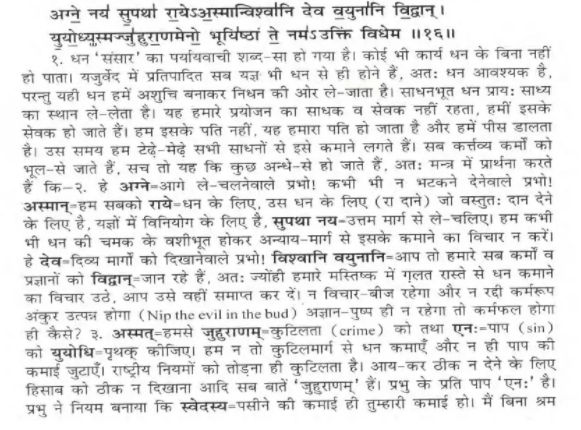

Stuti --Singing glories of Bhagwan.
Prarthana--Praying to ask something.
Upasana-- Sit near Bhagwan and do dhyan.
----------------------------------------------------------------------------------------------------------------------------------------------------------------------------------------------------------------------------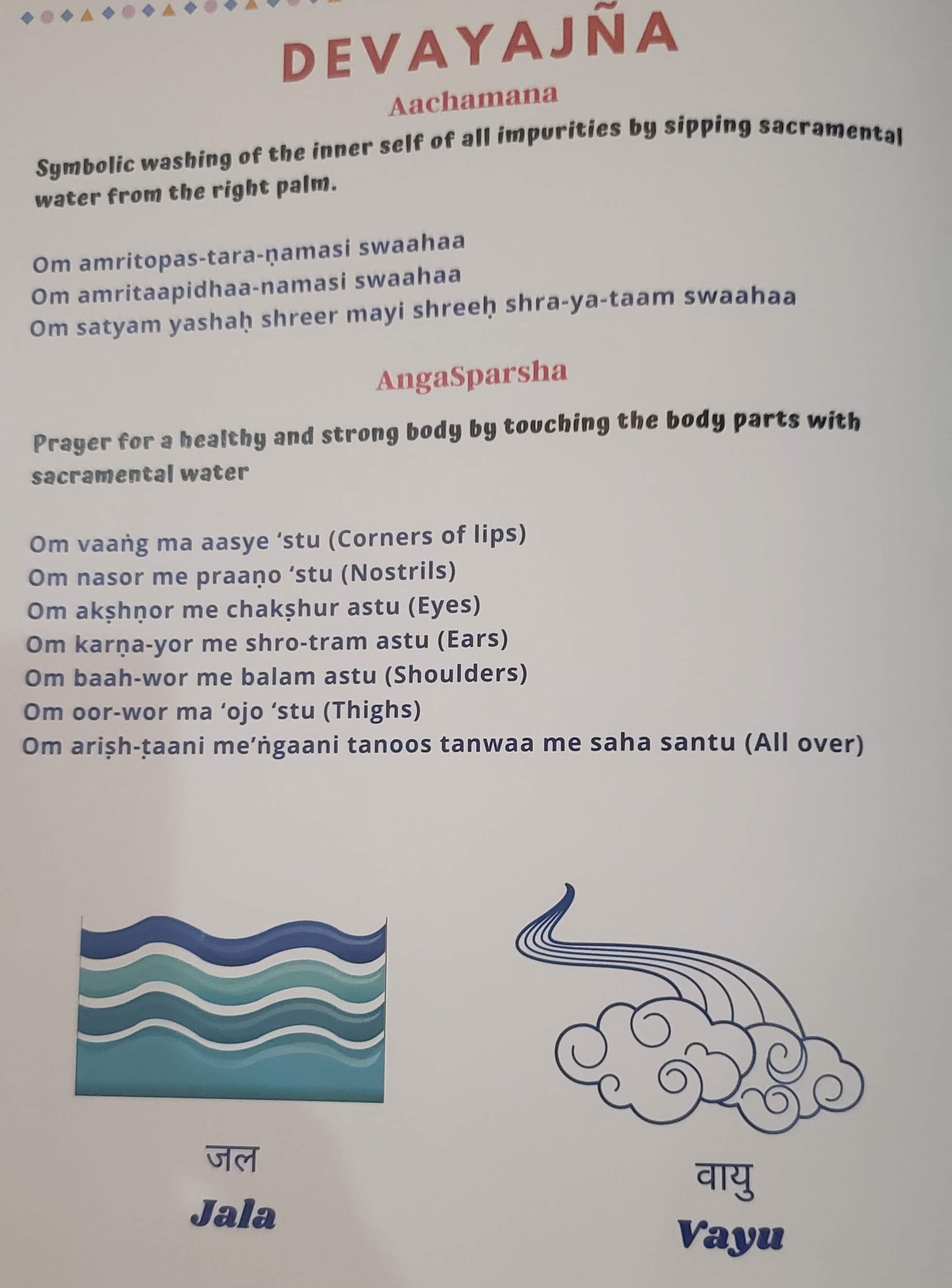
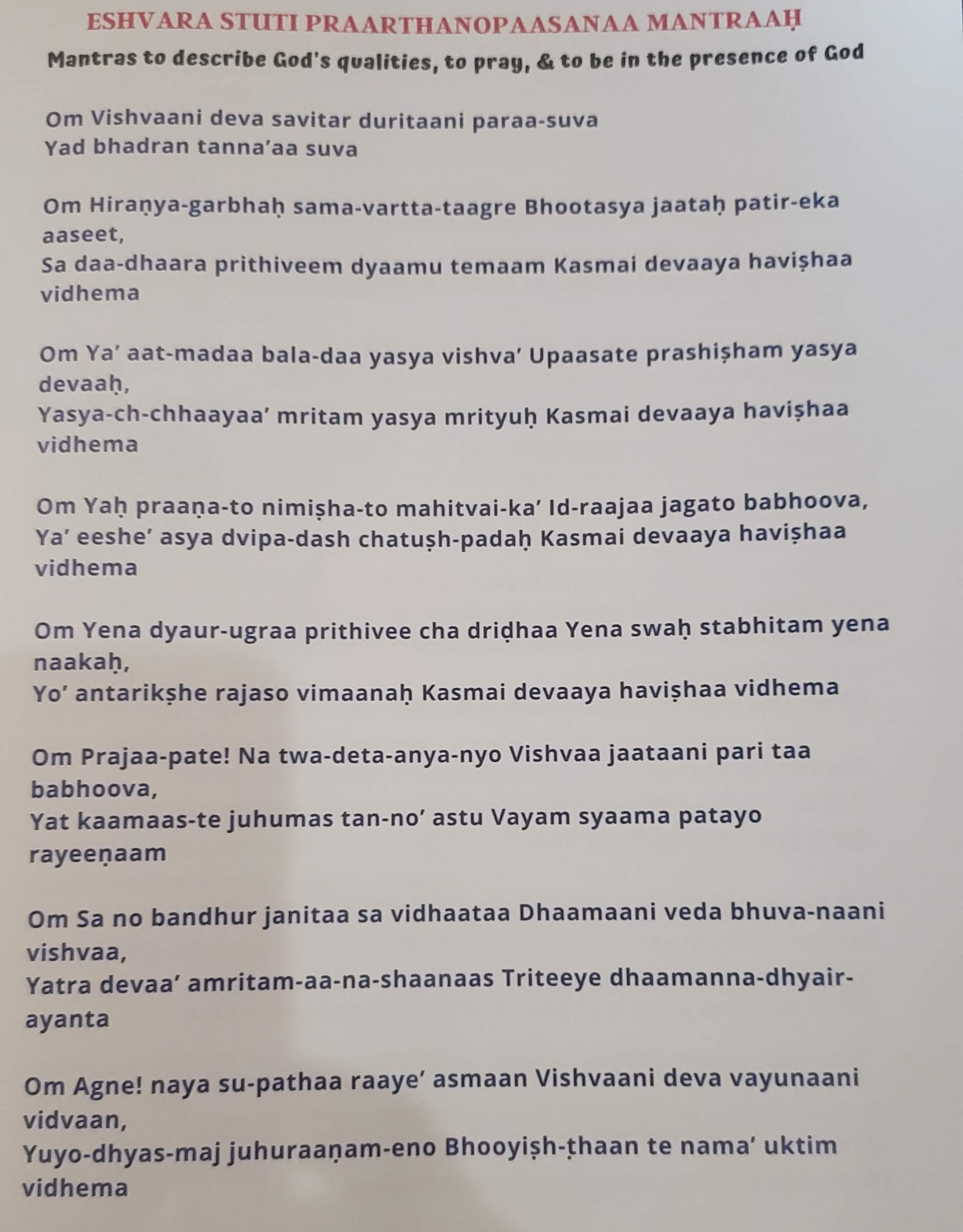
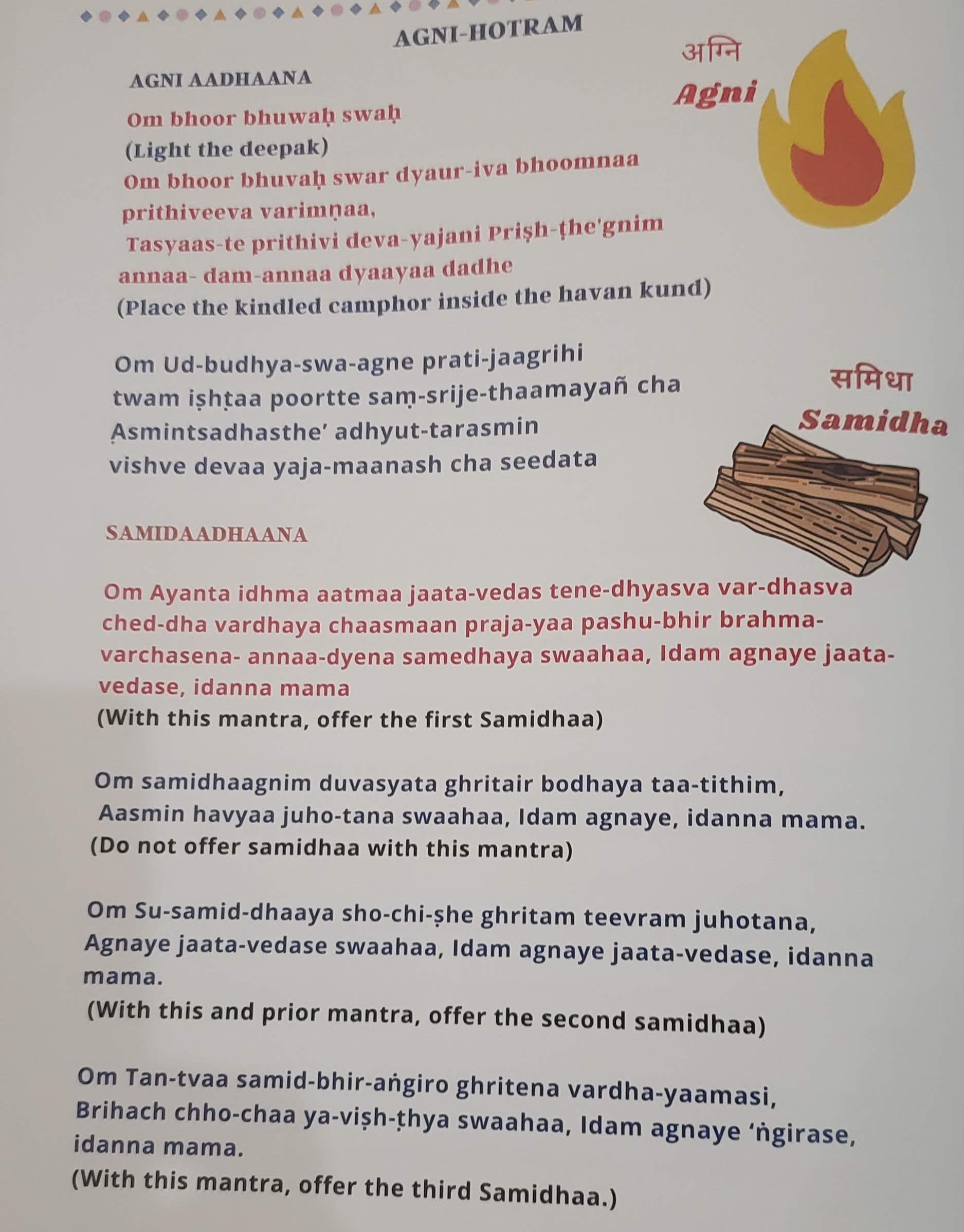
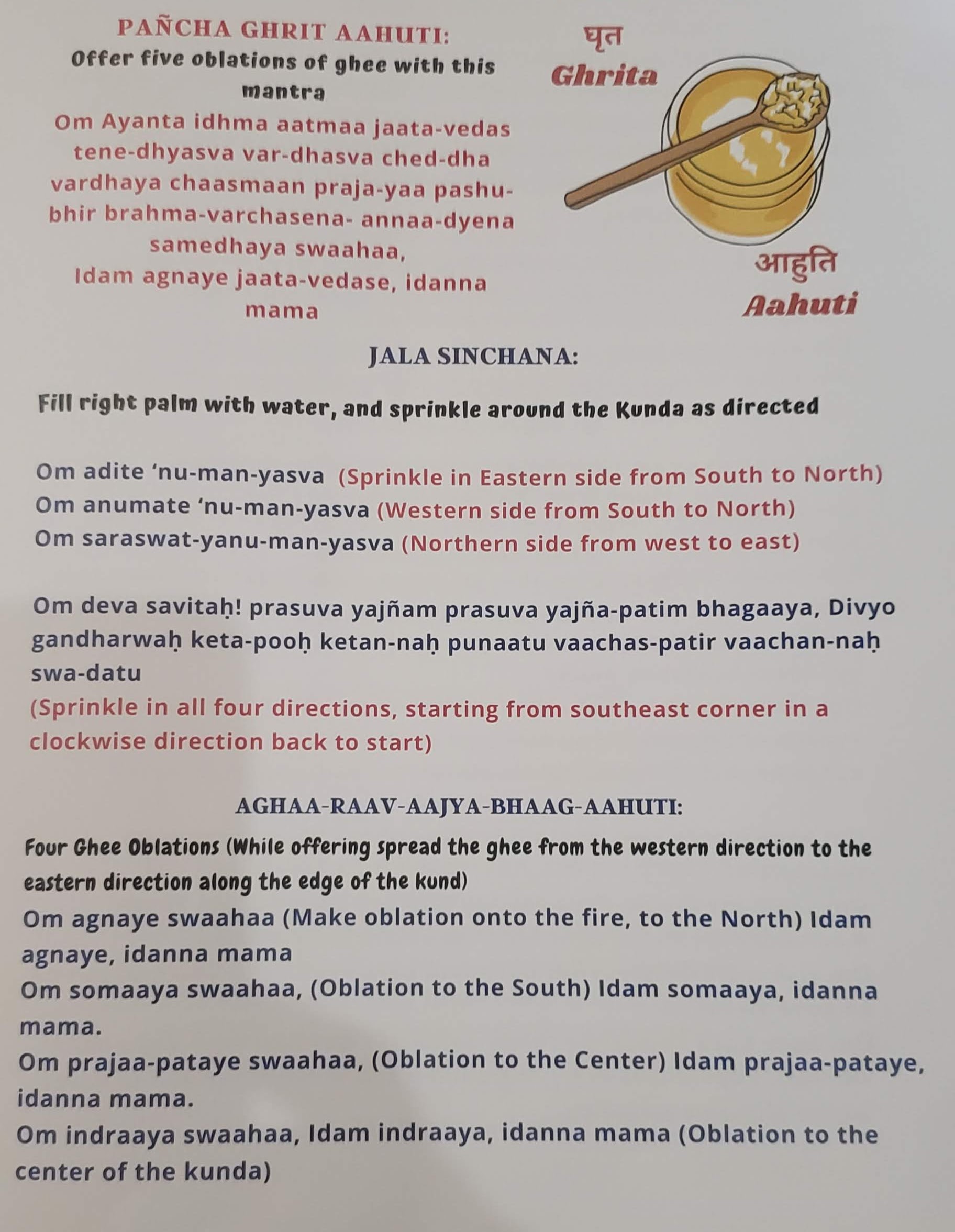
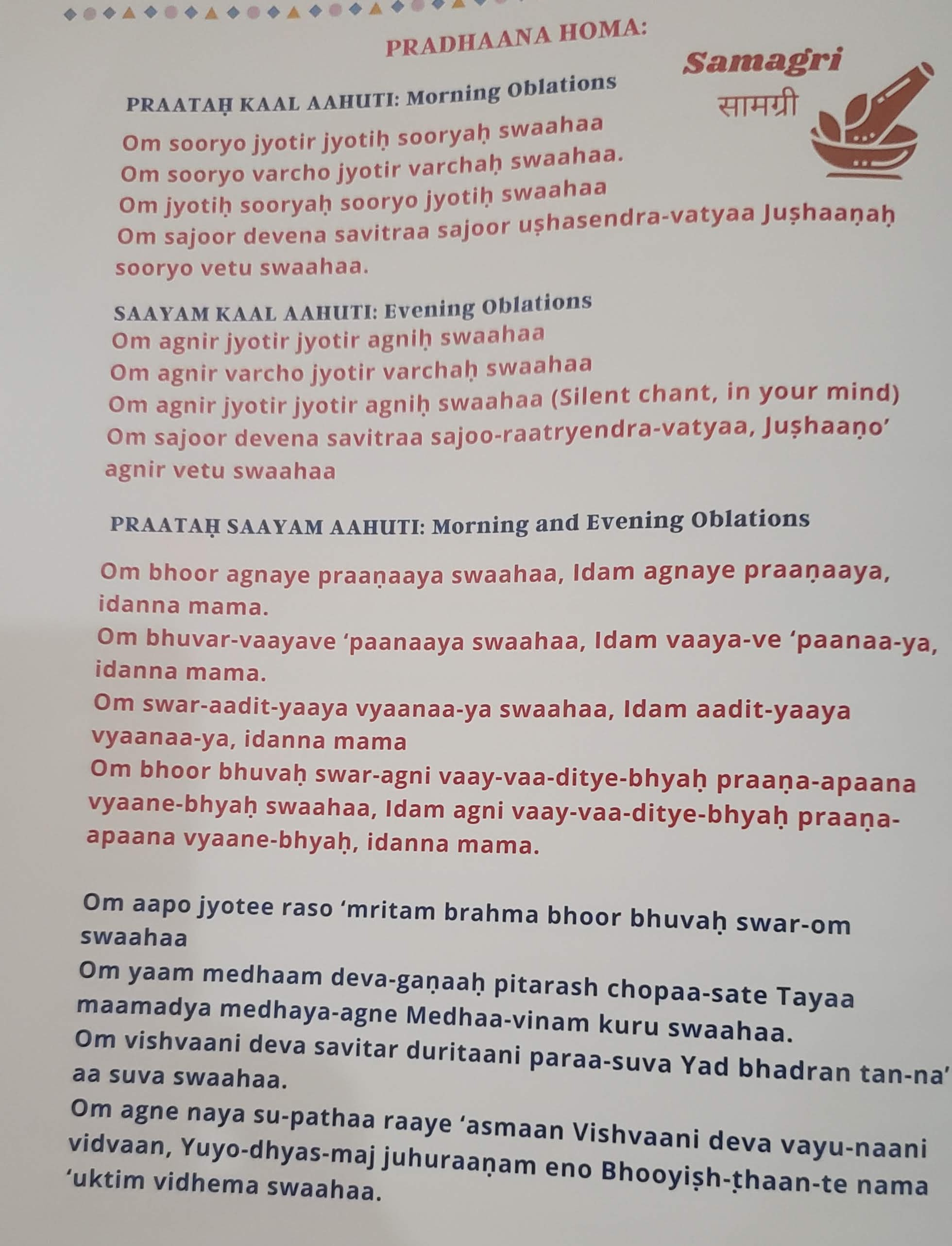
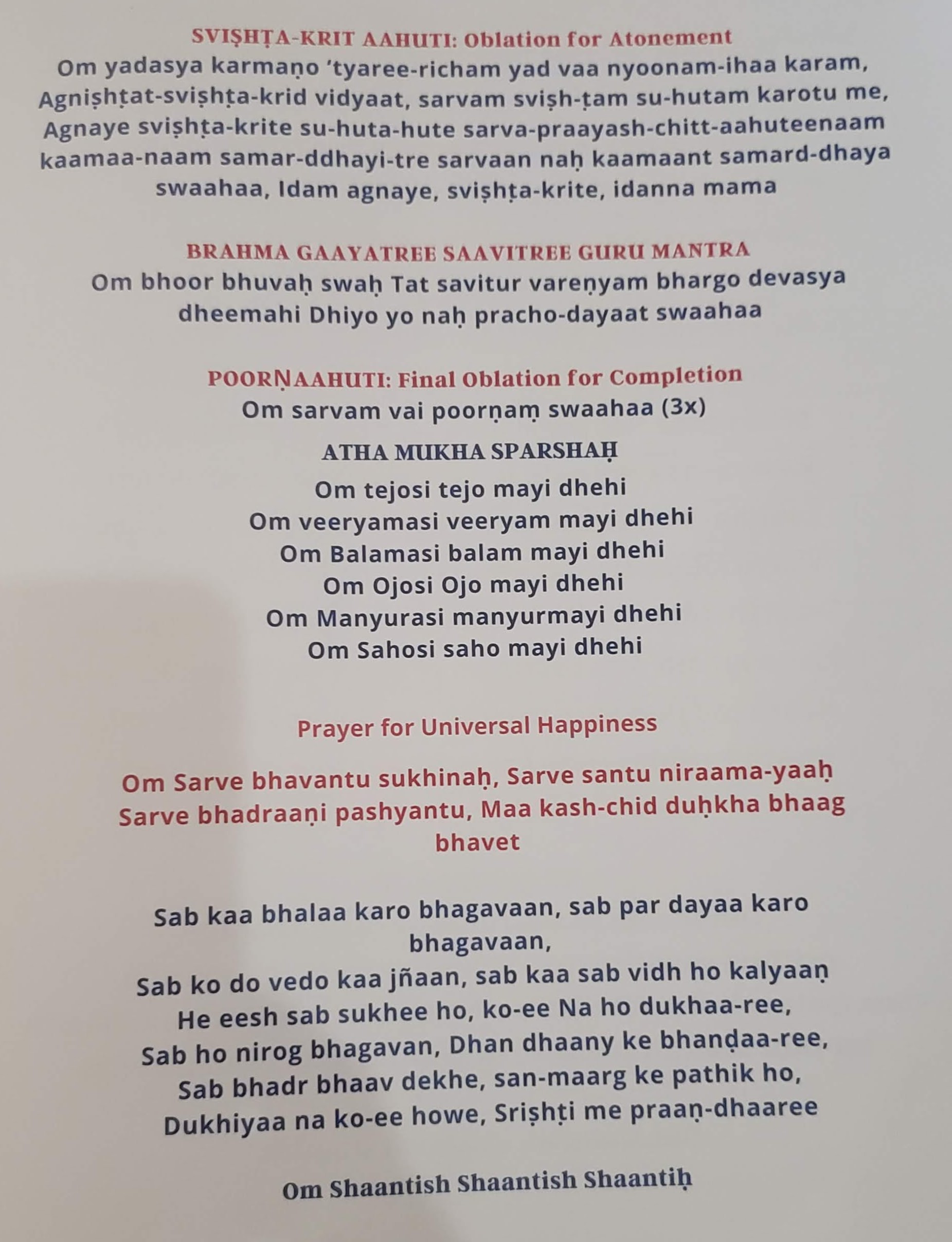
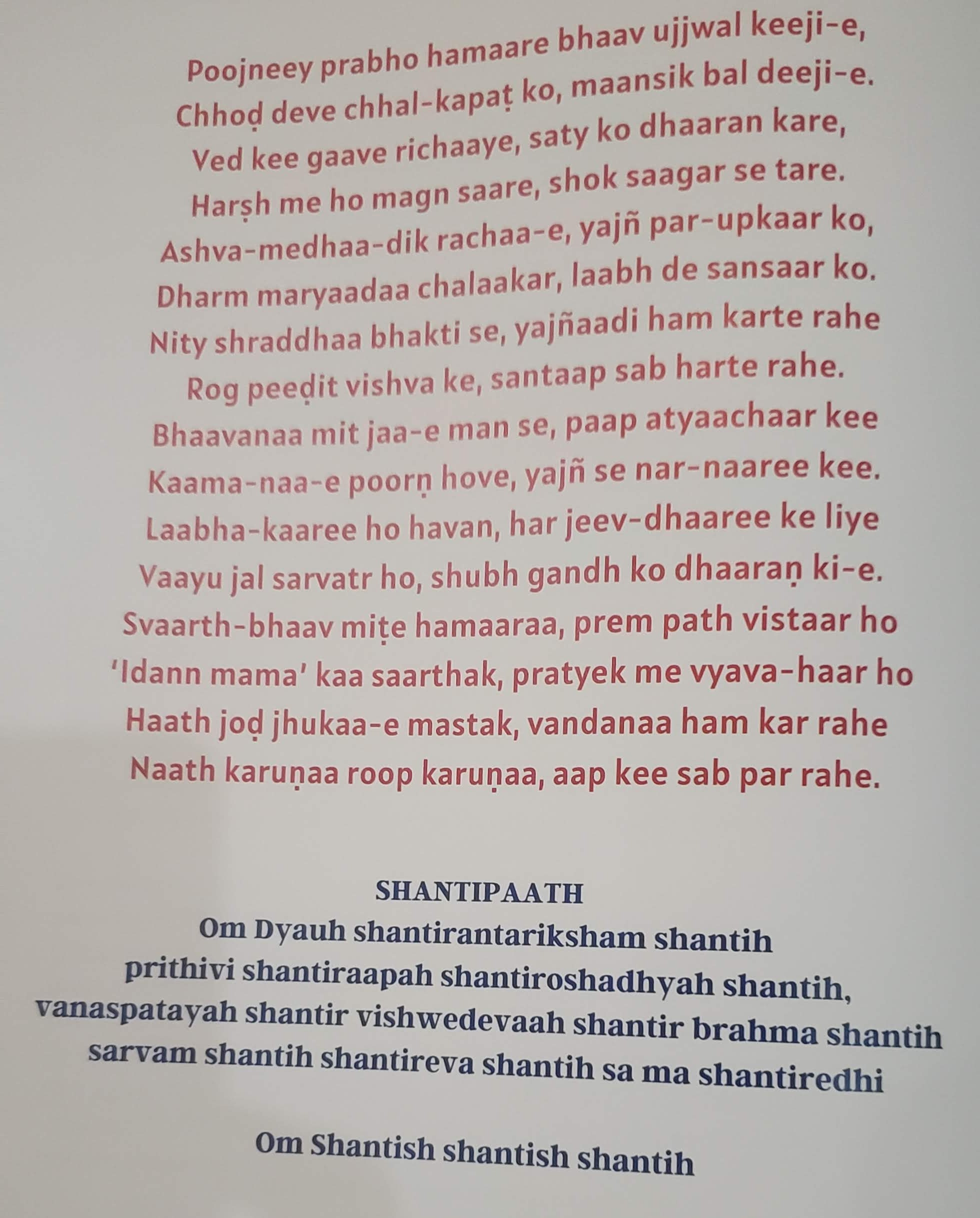
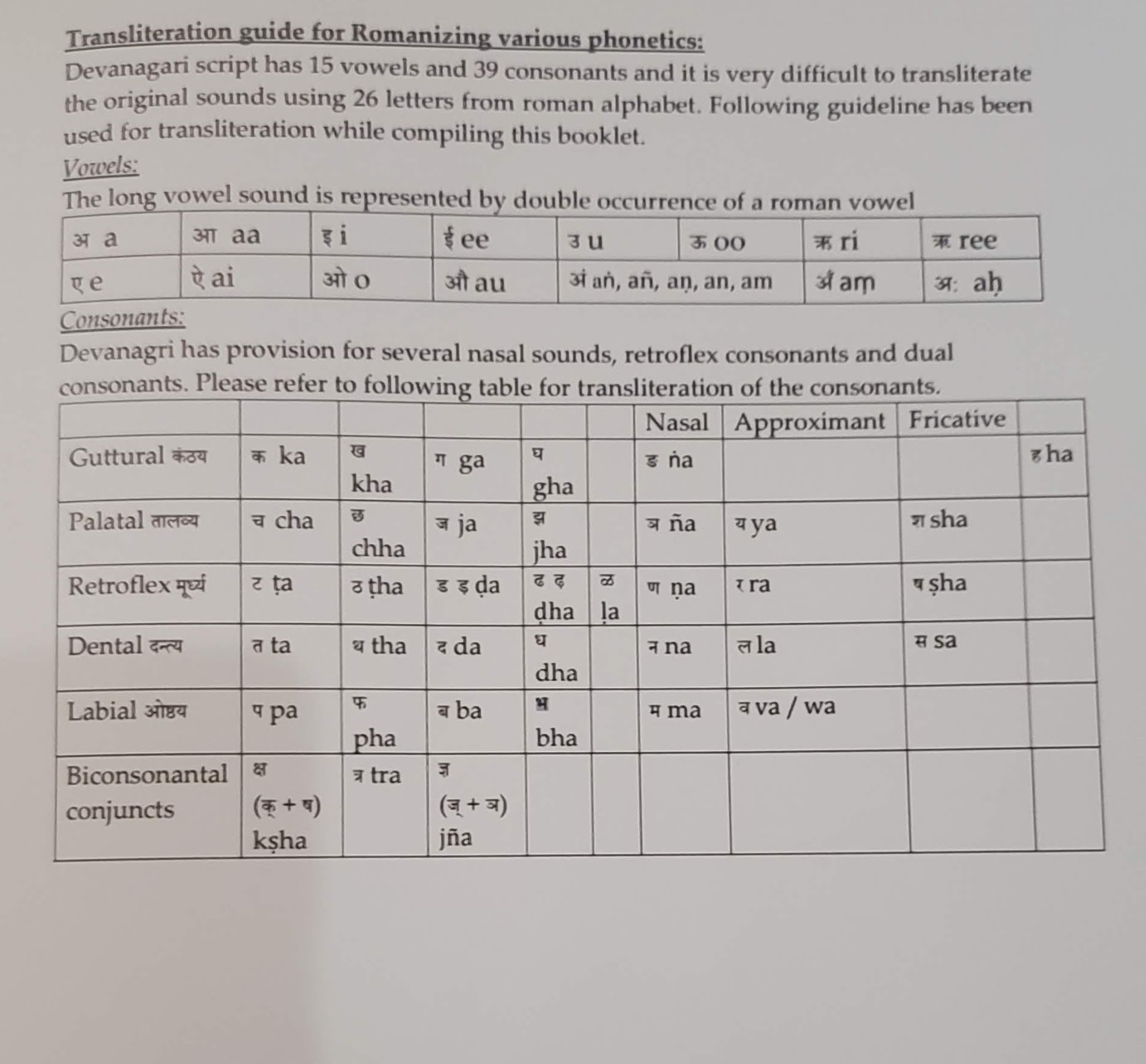
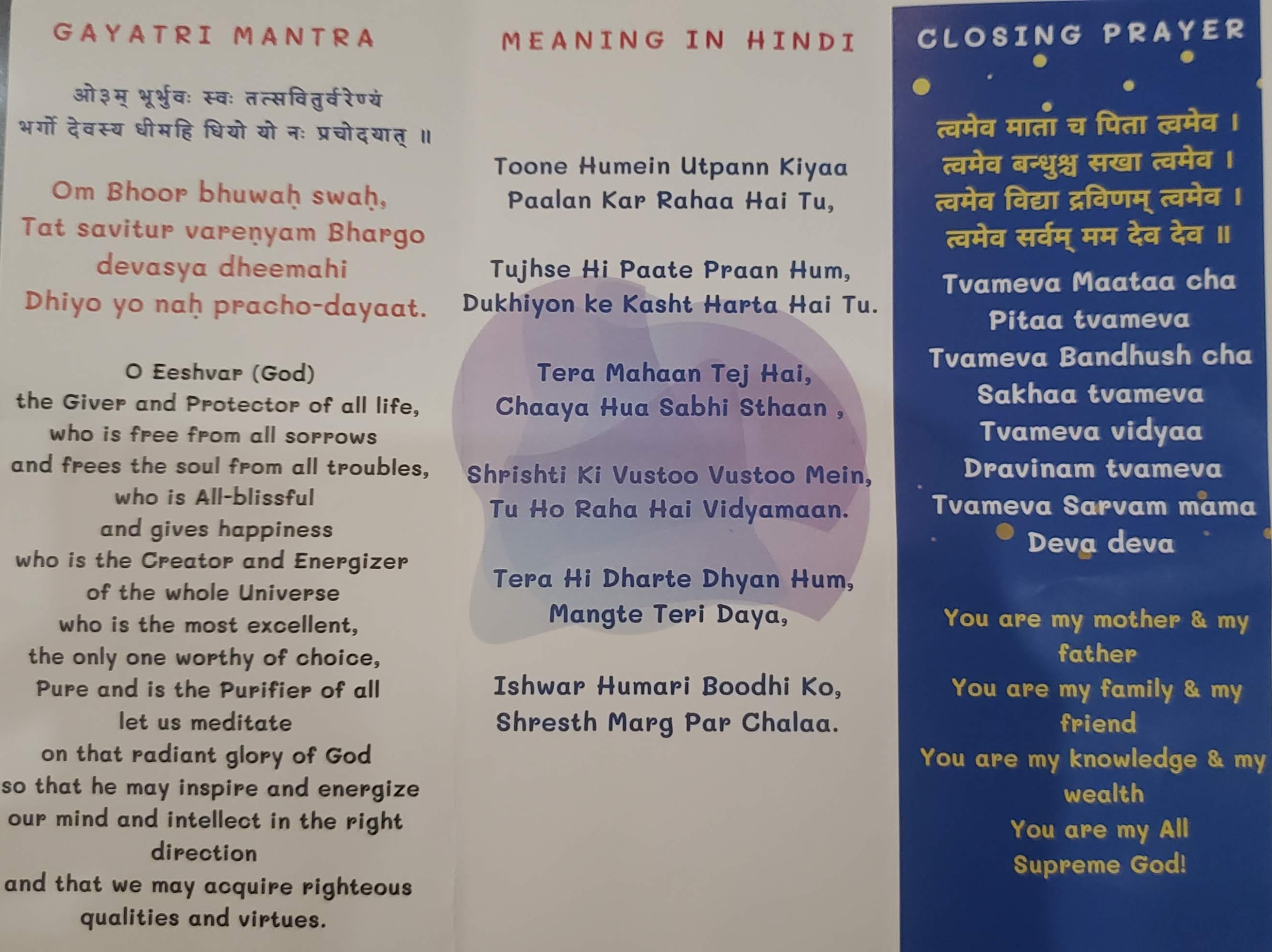
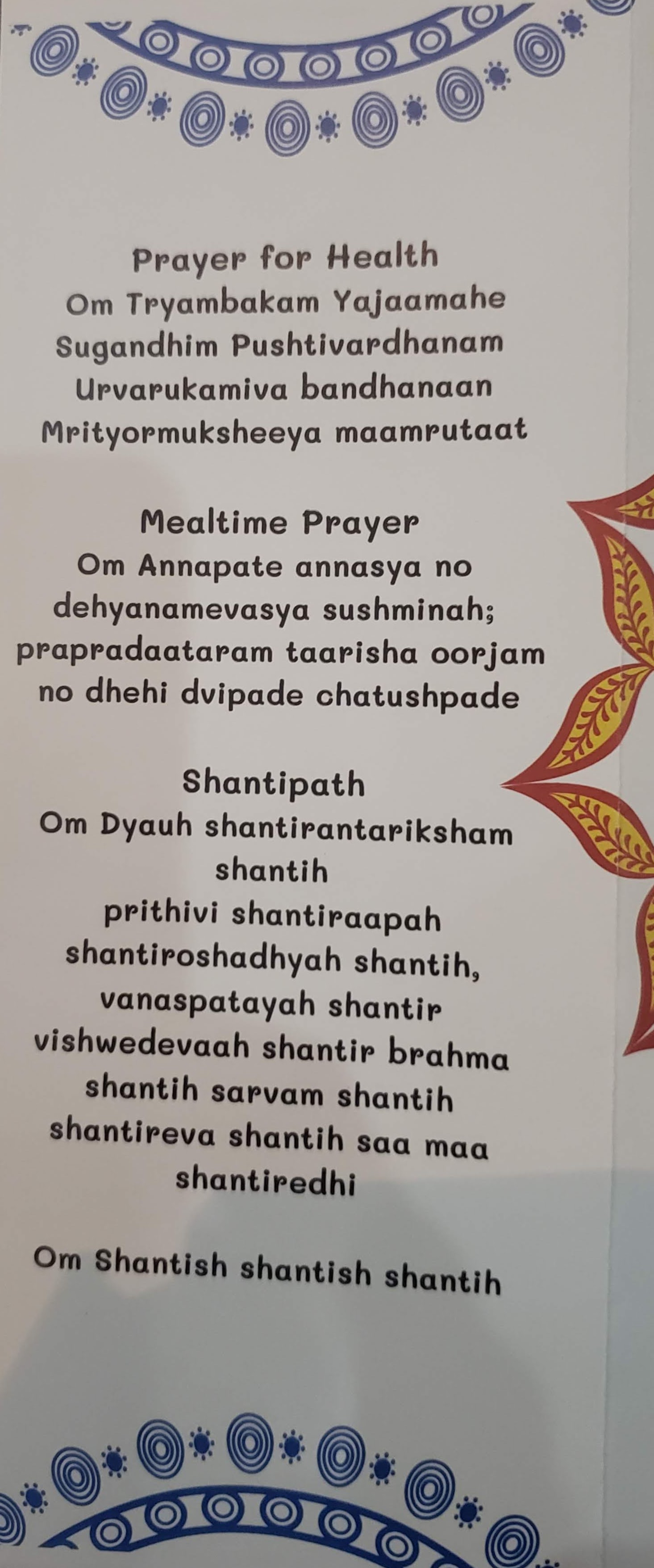
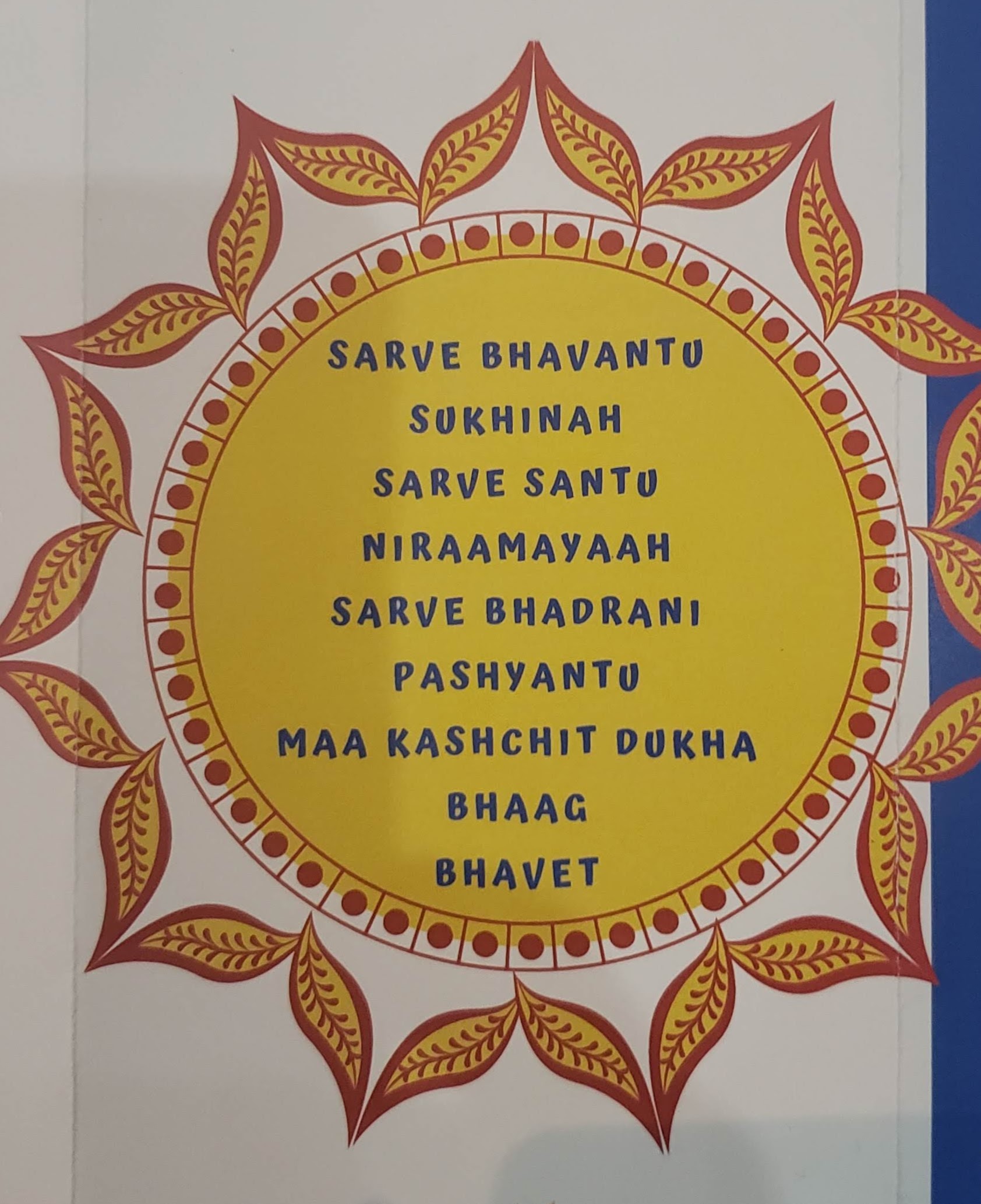
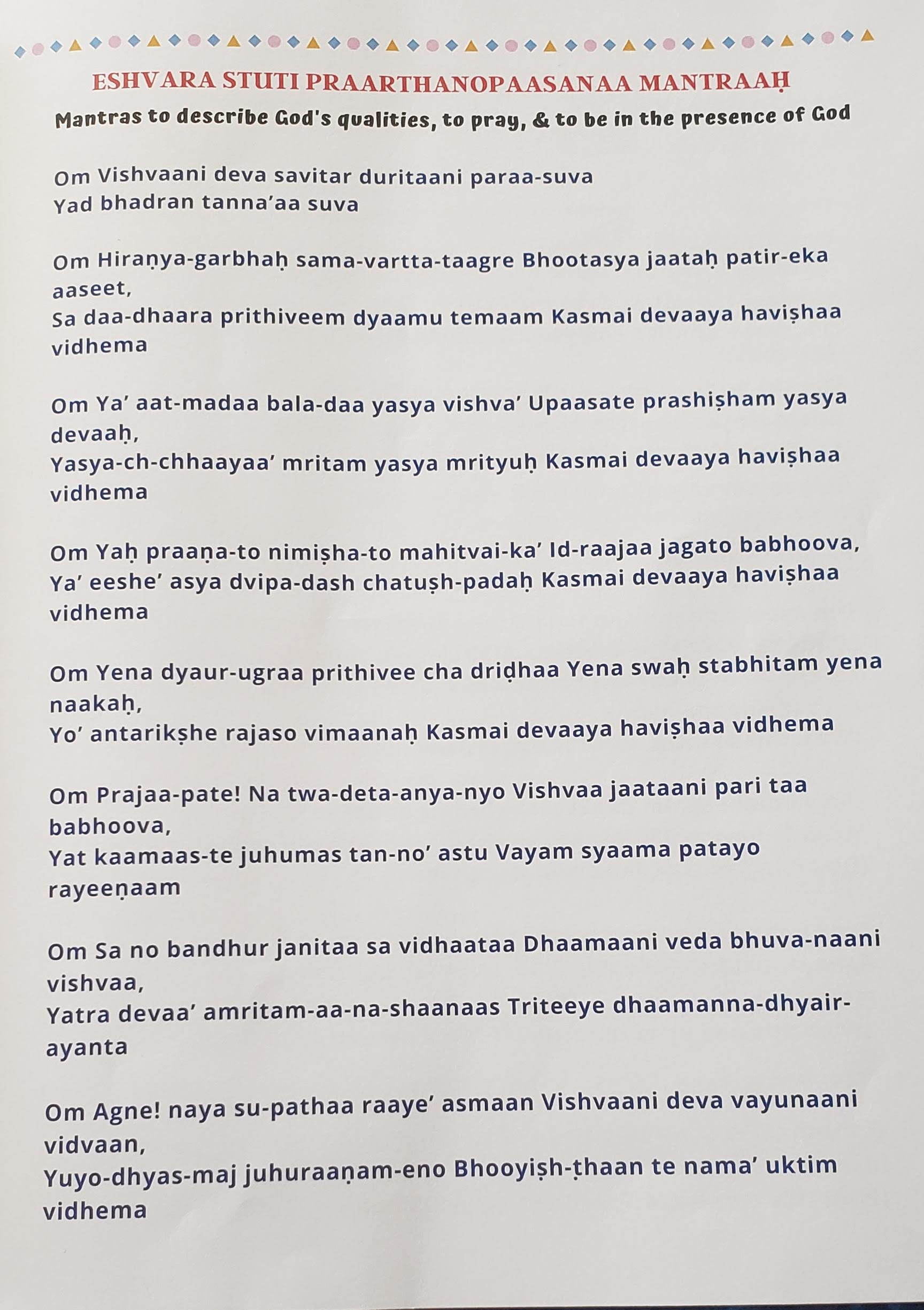
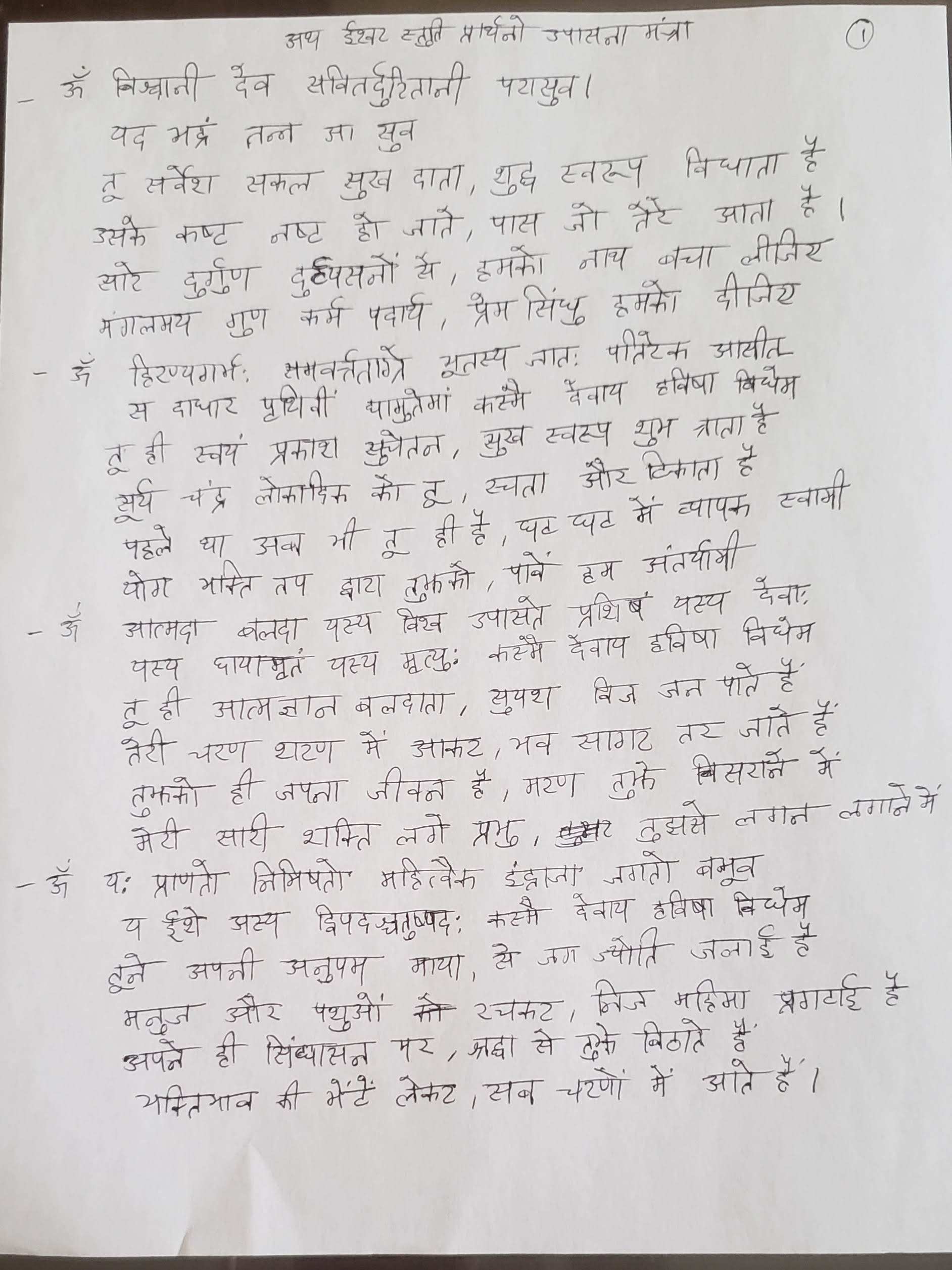
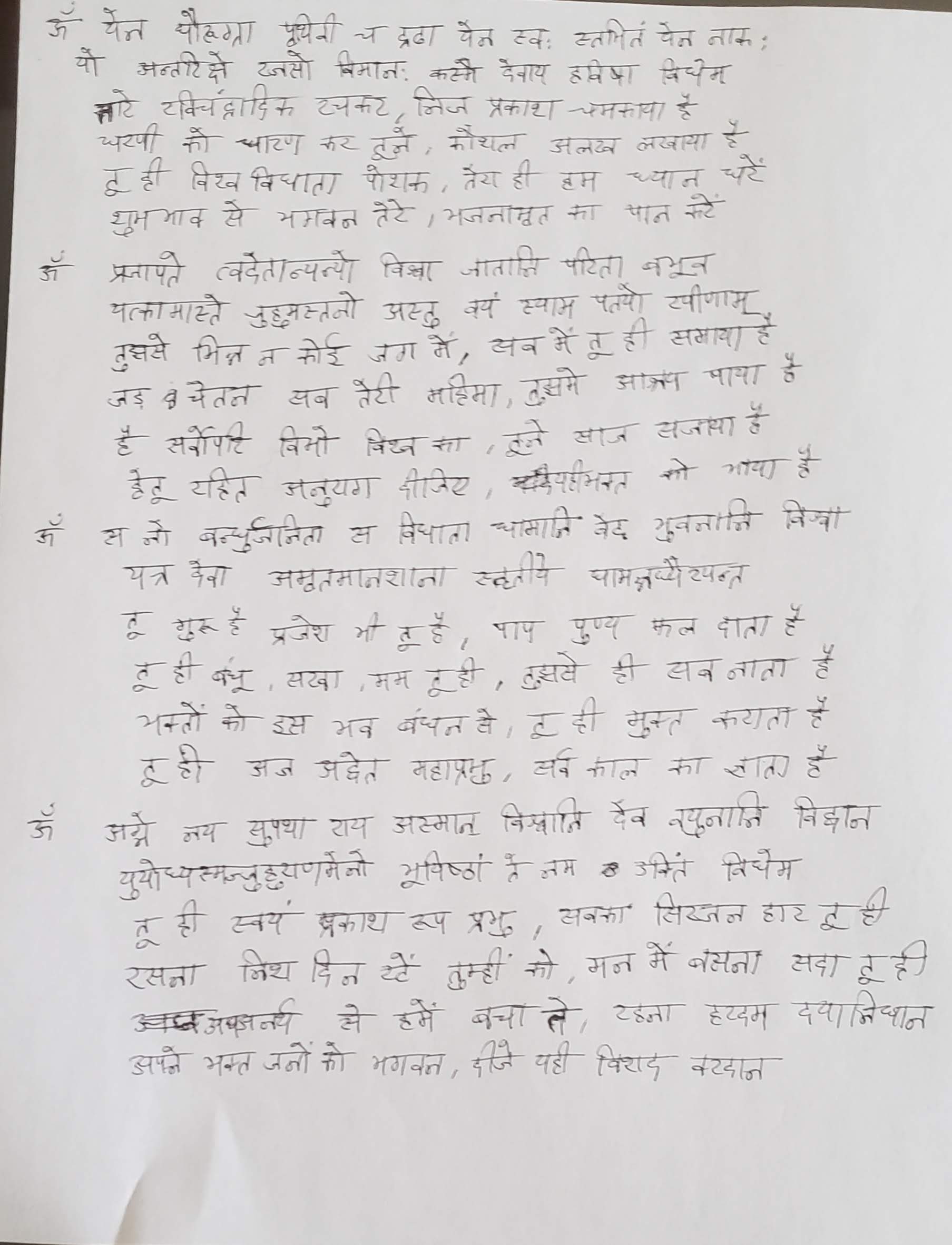
IShwarstutiprarthanamantra.mpeg
.jpg)
.jpg)

Hymns: RigVeda 1.10.1 and 2, Rishi: Vishwamitra, Devata: Indra
Devata: इन्द्र: Rishi: मधुच्छन्दाः वैश्वामित्रः Chhanda: विराड्नुष्टुप् Swara: गान्धारः
गाय॑न्ति त्वा गाय॒त्रिणोऽर्च॑न्त्य॒र्कम॒र्किणः॑। ब्र॒ह्माण॑स्त्वा शतक्रत॒ उद्वं॒शमि॑व येमिरे॥ 1. गाय॑न्ति। त्वा॒। गा॒य॒त्रिणः॑। अर्च॑न्ति। अ॒र्कम्। अ॒र्किणः॑। ब्र॒ह्माणः॑। त्वा॒। श॒त॒क्र॒तो॒ इति॑ शतऽक्रतो। उत्। वं॒शम्ऽइ॑व। ये॒मि॒रे॒॥
यत्सानोः॒ सानु॒मारु॑ह॒द्भूर्यस्प॑ष्ट॒ कर्त्व॑म्। तदिन्द्रो॒ अर्थं॑ चेतति यू॒थेन॑ वृ॒ष्णिरे॑जति॥2 यत्। सानोः॑। सानु॑म्। आ। अरु॑हत्। भूरि॑। अस्प॑ष्ट। कर्त्व॑म्। तत्। इन्द्रः॑। अर्थ॑म्। चे॒त॒ति॒। यू॒थेन॑। वृ॒ष्णिः। ए॒ज॒ति॒॥
गायिन ता गायितणः = Gayatris are singing of you, O Gayatri.
Note: Gayatri = sing-worthy, target of all singing
अचरिन अकर अिकर णः = Suns are worshipping Sun
बहाणः ता शतकतो उदंशिमव येिमरे = Supreme Lords, O supreme Lord, form
you in a hierarchical structure
यत्सानोः सानुंआरहत् = as climbing higher from one summit to another
भूिर असष कतर = makes things (down below) highly unclear
तत्इनः अथरचेतित = so Indra inspires meaning
युथेन वृिषः एजित = while Vrishni stirs multitudes
First verse establishes that there are multitudes of beings and hierarchies, though all are Self.
Lord is arranged in a structure that contains Lords; Sun is worshipped, by Suns; and, Gayatri is
sung of, by Gayatris!
Second verse speaks of how consciousness is aware of one level in this hierarchy and unaware of
levels below.
A simple example can drive the point home: When I open my eyes and some light falls on them,
cells in the eye, cells in optical nerves and cells in brain work together to produce the notion that I
am seeing so and so object. I am aware of the object, but not of various sensations in various
cells.
Vrish means to rain or storm. Vrishni is the deity who storms consciousness by stirring multitudes
of its parts into action. But we are not aware of it. At the summit of those actions by those cells is
Indra, who inspires an "understanding" (अथरचेतित) based on those multitudes of sensations. We
are aware only of that understanding ("I am seeing so and so object") and not of all the
sensations that brought it, just as one on a high summit does not see what is below clearly.
However, as the first verse says, Vrishni and multitudes of aspects of consciousness stirred into
action by him, are all Self! The operational hierarchy does not imply superiority and inferiority.
All are Self, but they do play different roles in a hierarchy. It is more nuanced than saying "all is
Self and any division/duality is a delusion".
Different aspect of Self play different roles in various hierarchical structures. When we are aware
of one level in the hierarchy, the lower levels may be obscure or quite unclear. By extension, there
may be higher summits supported by various realities/experiences we have now, on reaching
which these realities/experiences may just fade away into obscurity!
The simple act of thinking of this sentence and typing it involves billions of cells working
together nicely! All those cells and consciousness operating through them are Self too, though I
am not explicitly aware of them.
-
Word-Meaning: -हे (शतक्रतो) असंख्यात कर्म और उत्तम ज्ञानयुक्त परमेश्वर ! (ब्रह्माणः) जैसे वेदों को पढ़कर उत्तम-उत्तम क्रिया करनेवाले मनुष्य श्रेष्ठ उपदेश, गुण और अच्छी-अच्छी शिक्षाओं से (वंशम्) अपने वंश को (उद्येमिरे) प्रशस्त गुणयुक्त करके उद्यमवान् करते हैं, वैसे ही (गायत्रिणः) जो गायत्र अर्थात् प्रशंसा करने योग्य छन्दराग आदि पढ़े हुए धार्मिक और ईश्वर की उपासना करनेवाले हैं, वे पुरुष (त्वा) आपकी (गायन्ति) सामवेदादि के गानों से प्रशंसा करते हैं, तथा (अर्किणः) अर्क अर्थात् जो कि वेद के मन्त्र पढ़ने के नित्य अभ्यासी हैं, वे (अर्कम्) सब मनुष्यों को पूजने योग्य (त्वा) आपका (अर्चन्ति) नित्य पूजन करते हैं॥१॥
Connotation: -इस मन्त्र में उपमालङ्कार है। जैसे सब मनुष्यों को परमेश्वर ही की पूजा करनी चाहिये अर्थात् उसकी आज्ञा के अनुकूल वेदविद्या को पढ़कर अच्छे-अच्छे गुणों के साथ अपने और अन्यों के वंश को भी पुरुषार्थी करते हैं, वैसे ही अपने आप को भी होना चाहिये। और जो परमेश्वर के सिवाय दूसरे का पूजन करनेवाला पुरुष है, वह कभी उत्तम फल को प्राप्त होने योग्य नहीं हो सकता, क्योंकि न तो ईश्वर की ऐसी आज्ञा ही है, और न ईश्वर के समान कोई दूसरा पदार्थ है कि जिसका उसके स्थान में पूजन किया जावे। इससे सब मनुष्यों को उचित है कि परमेश्वर ही का गान और पूजन करें॥१॥ -
Word-Meaning: -जैसे (यूथेन) वायुगण अथवा सुख के साधन हेतु पदार्थों के साथ (वृष्णिः) वर्षा करनेवाला सूर्य्य अपने किरणसमूह से प्रकाश करके (सानोः) पर्वत के एक शिखर से (सानुम्) दूसरे शिखर को (भूरि) बहुधा (आरुहत्) प्राप्त होता (अस्पष्ट) स्पर्श करता (एजति) क्रम से अपनी कक्षा में घूमता और घुमाता है, वैसे ही जो मनुष्य क्रम से एक कर्म को सिद्ध करके दूसरे को (कर्त्त्वम्) करने को (भूरि) बहुधा (आरुहत्) आरम्भ तथा (अस्पष्ट) स्पर्श करता हुआ (एजति) प्राप्त होता है, उस पुरुष के लिये (इन्द्रः) सर्वज्ञ ईश्वर उन कर्मों के करने को (सानोः) अनुक्रम से (अर्थम्) प्रयोजन के विभाग के साथ (भूरि) अच्छी प्रकार (चेतति) प्रकाश करता है॥२॥
Connotation: -इस मन्त्र में भी इव शब्द की अनुवृत्ति से उपमालङ्कार समझना चाहिये। जैसे सूर्य्य अपने सम्मुख के पदार्थों को वायु के साथ वारंवार क्रम से अच्छी प्रकार आक्रमण, आकर्षण और प्रकाश करके सब पृथिव्यादि लोकों को घुमाता है, वैसे ही जो मनुष्य विद्या से करने योग्य अनेक कर्मों को सिद्ध करने के लिये प्रवृत्त होता है, वही अनेक क्रियाओं से सब कार्य्यों के करने को समर्थ हो सकता तथा ईश्वर की सृष्टि में अनेक सुखों को प्राप्त होता, और उसी मनुष्य को ईश्वर भी अपनी कृपादृष्टि से देखता है, आलसी को नहीं॥२॥